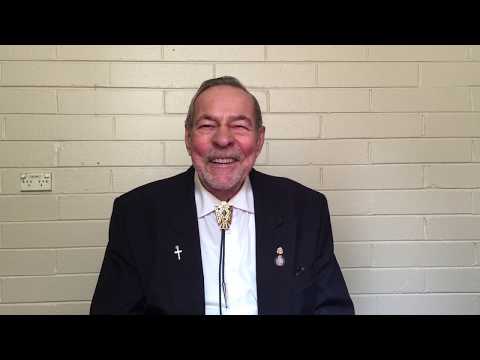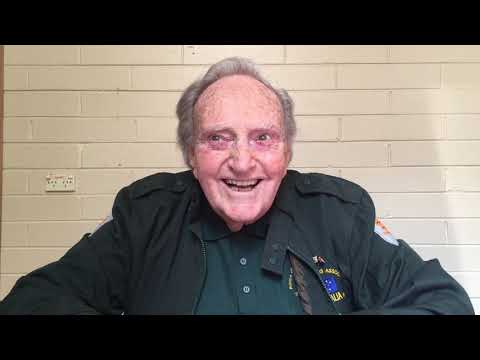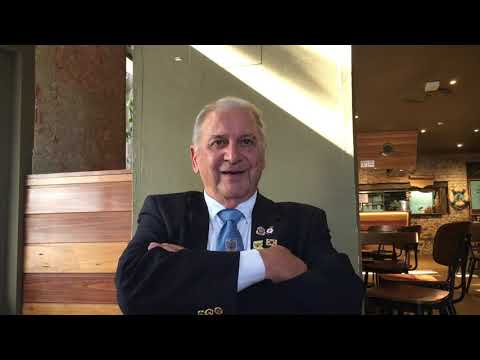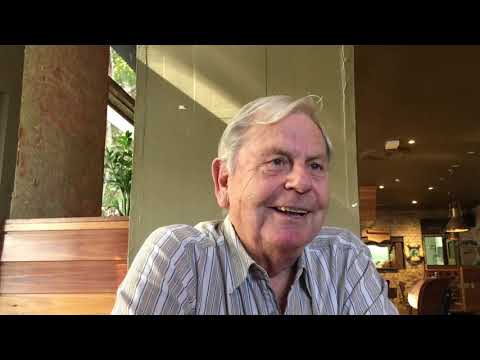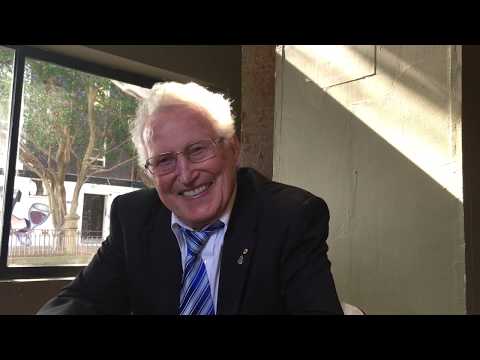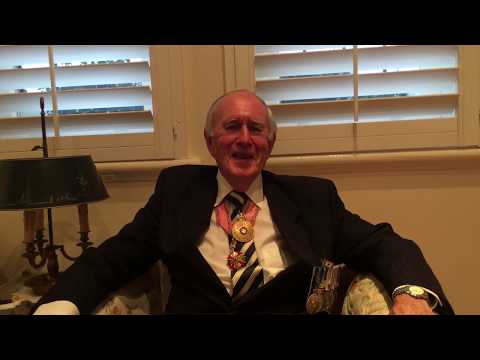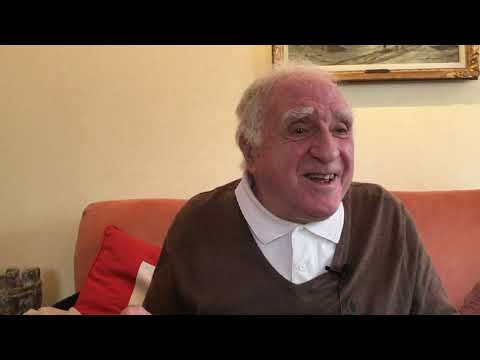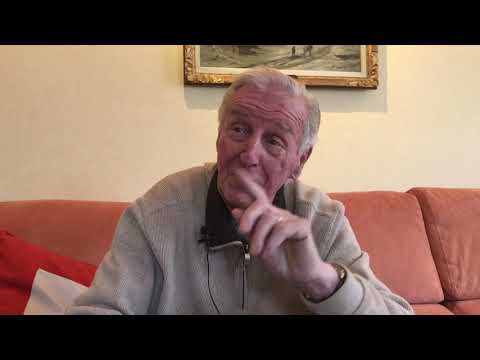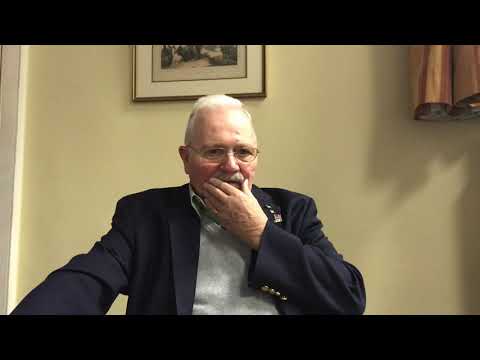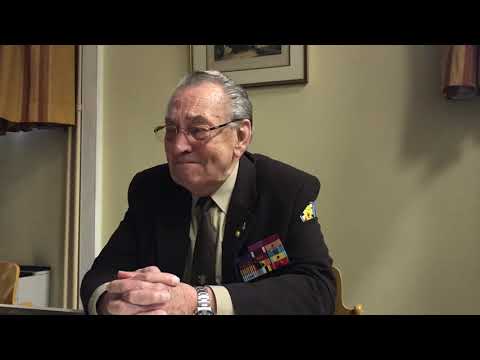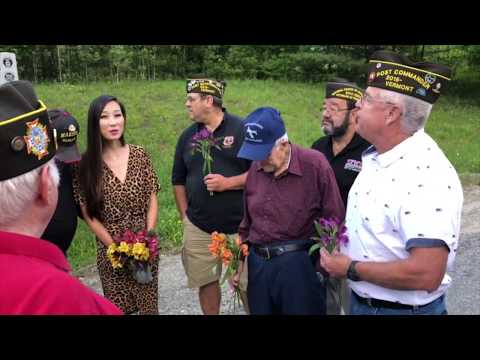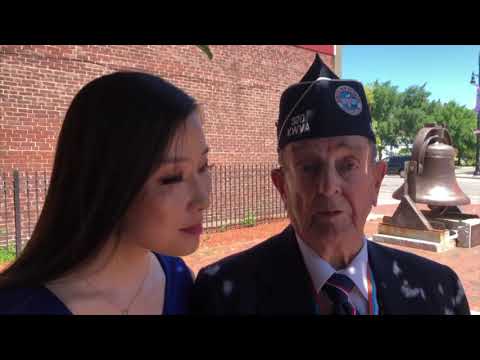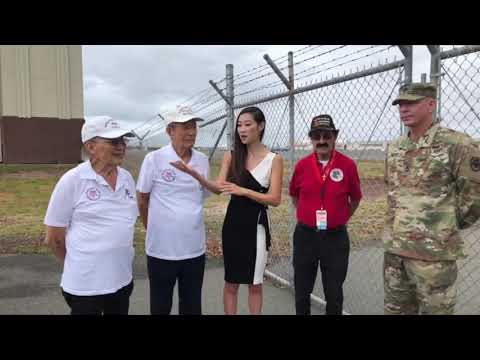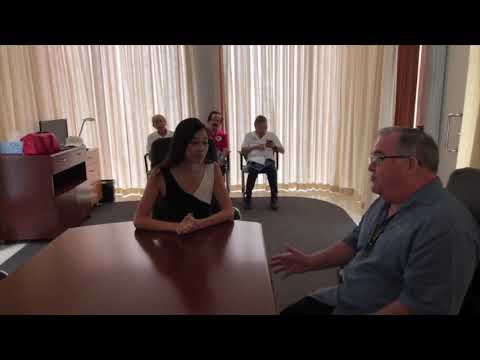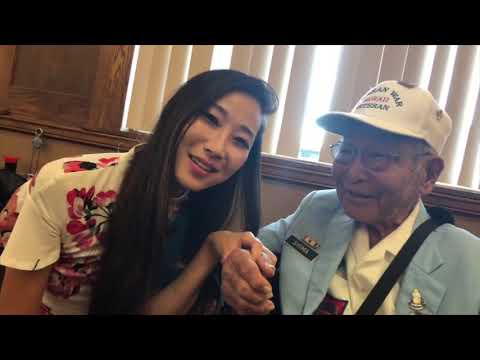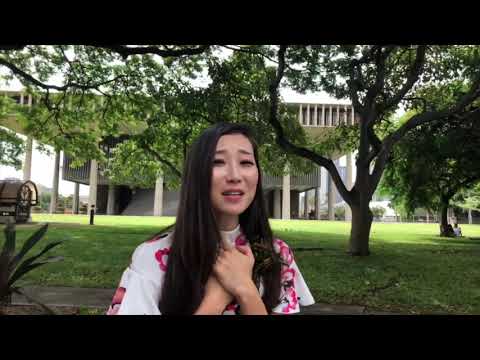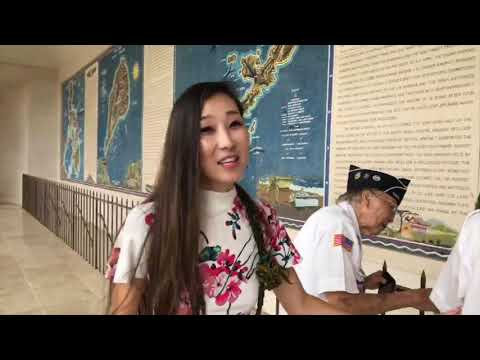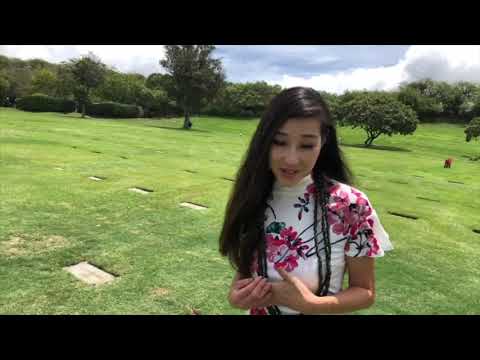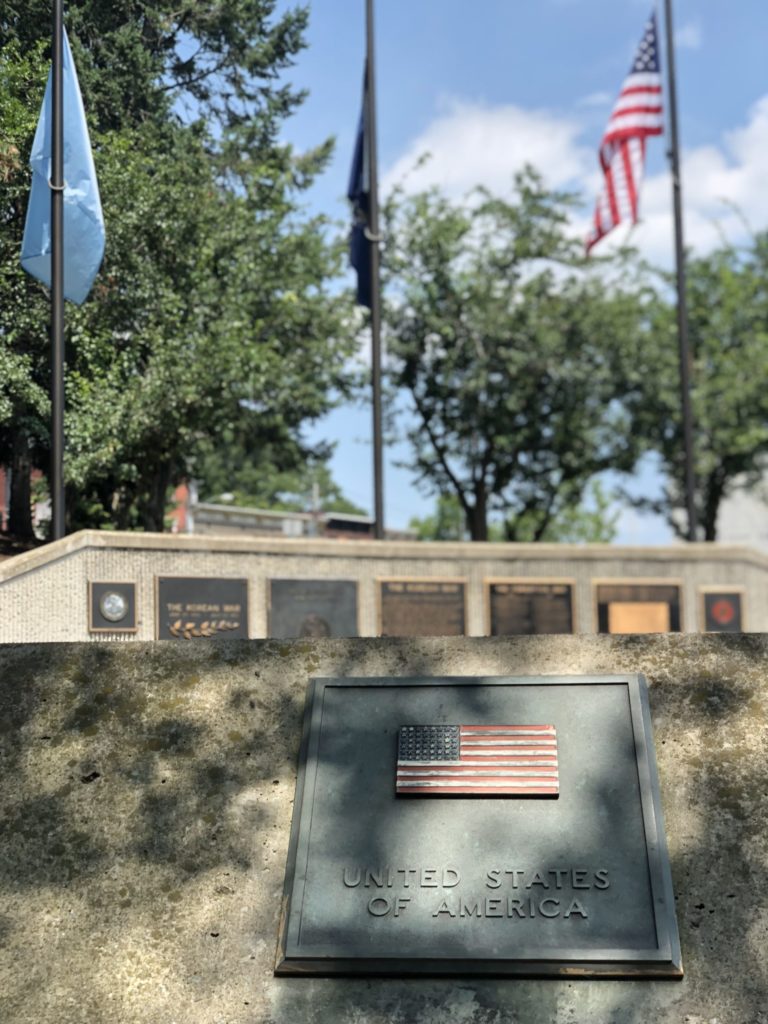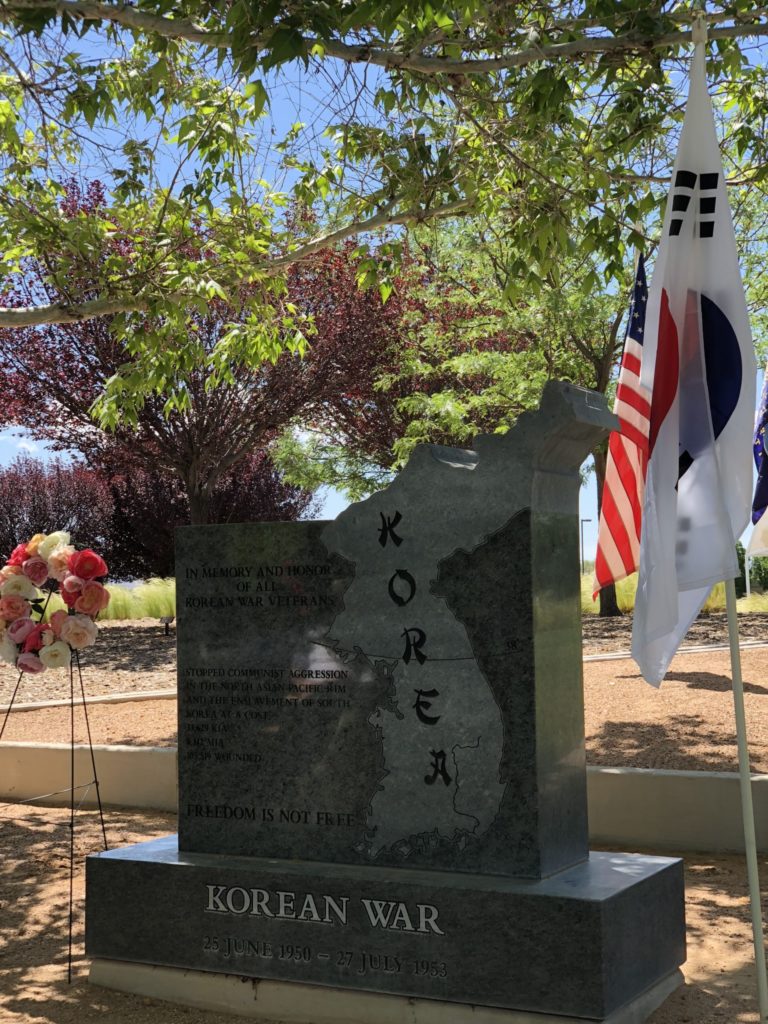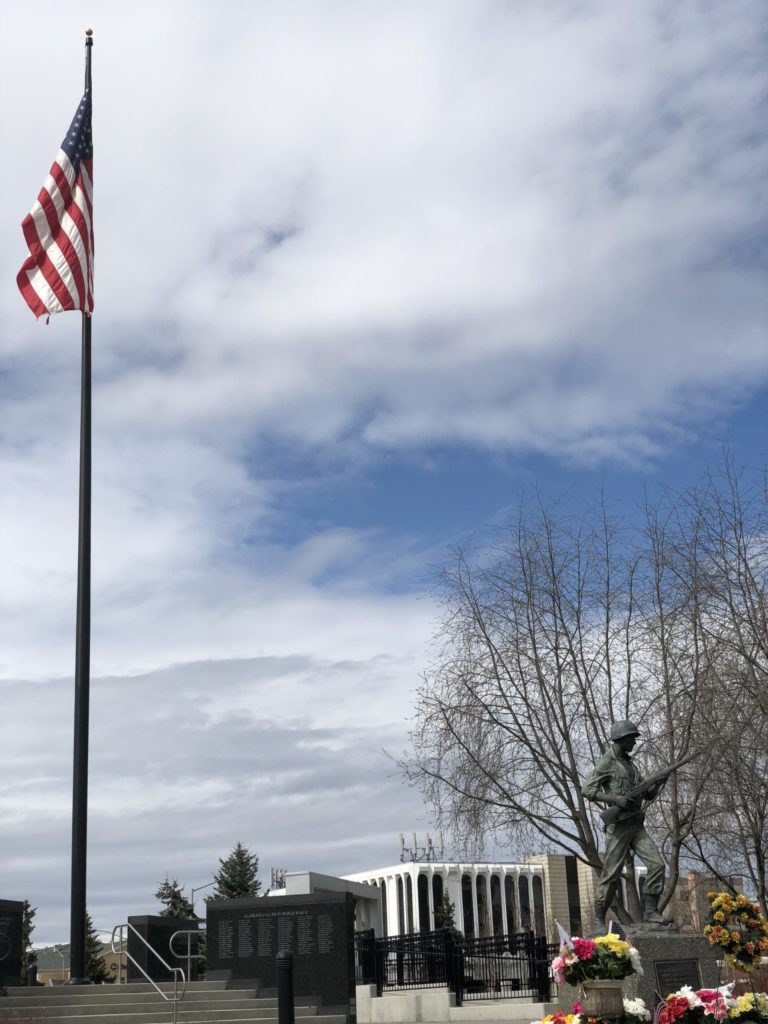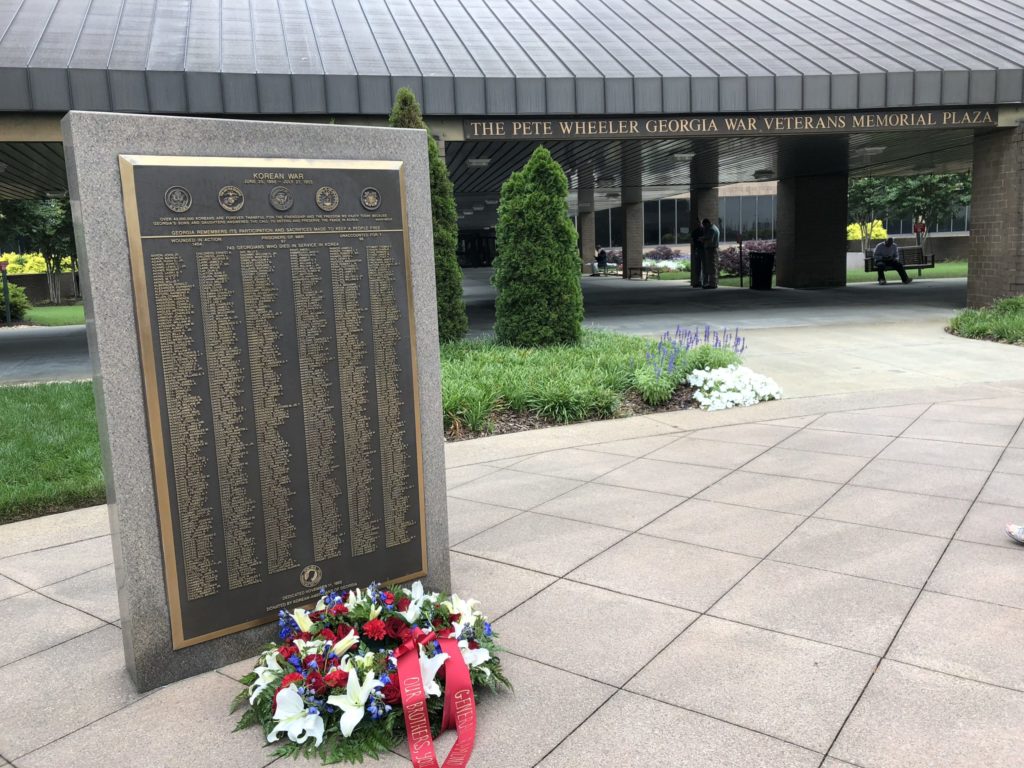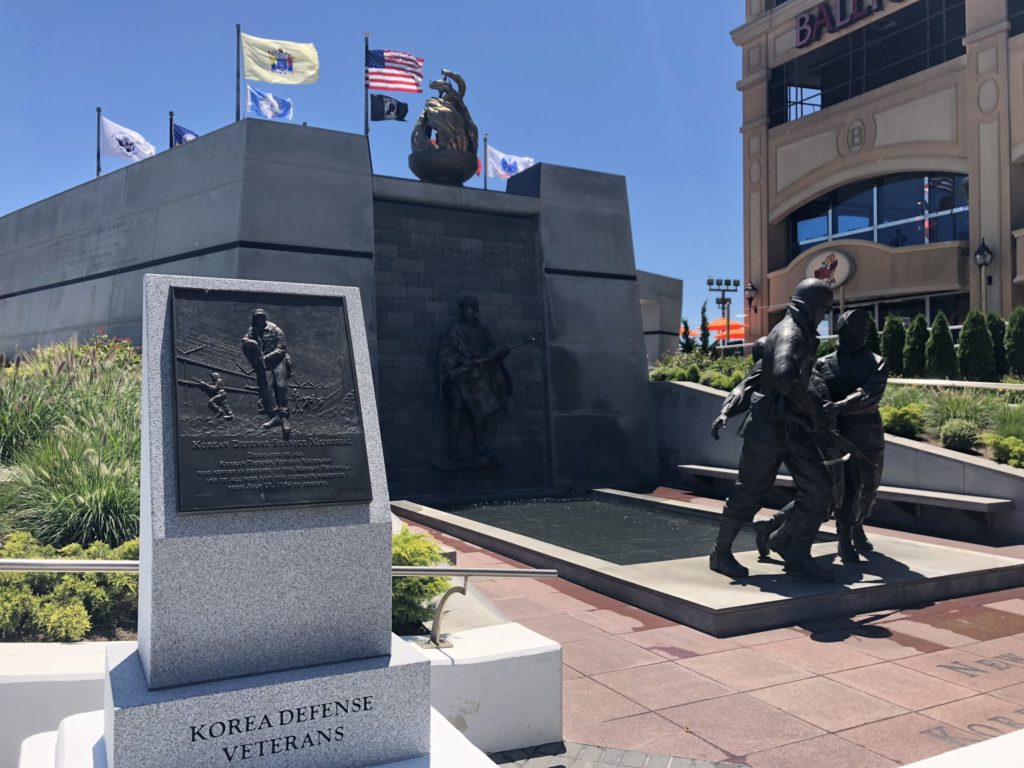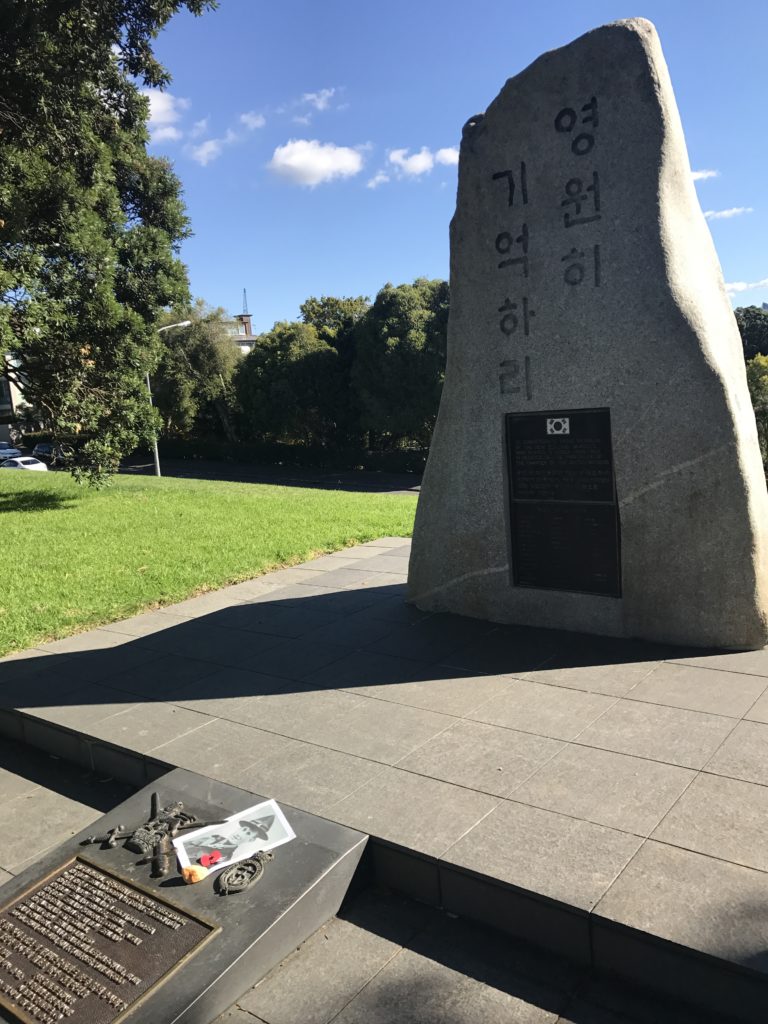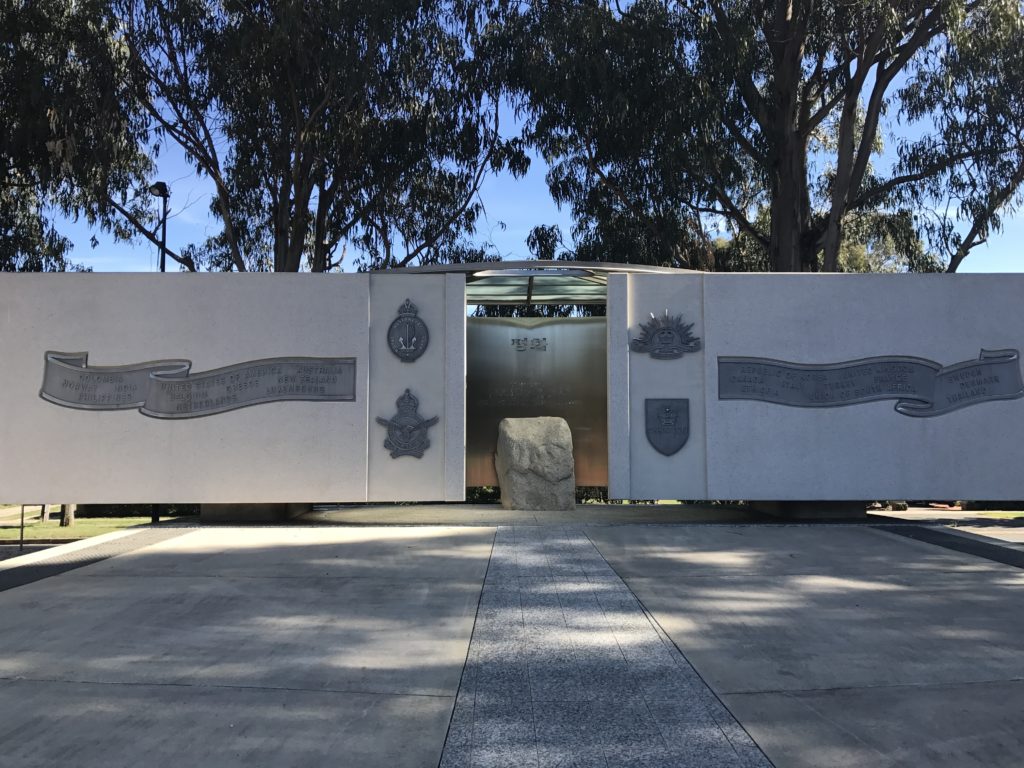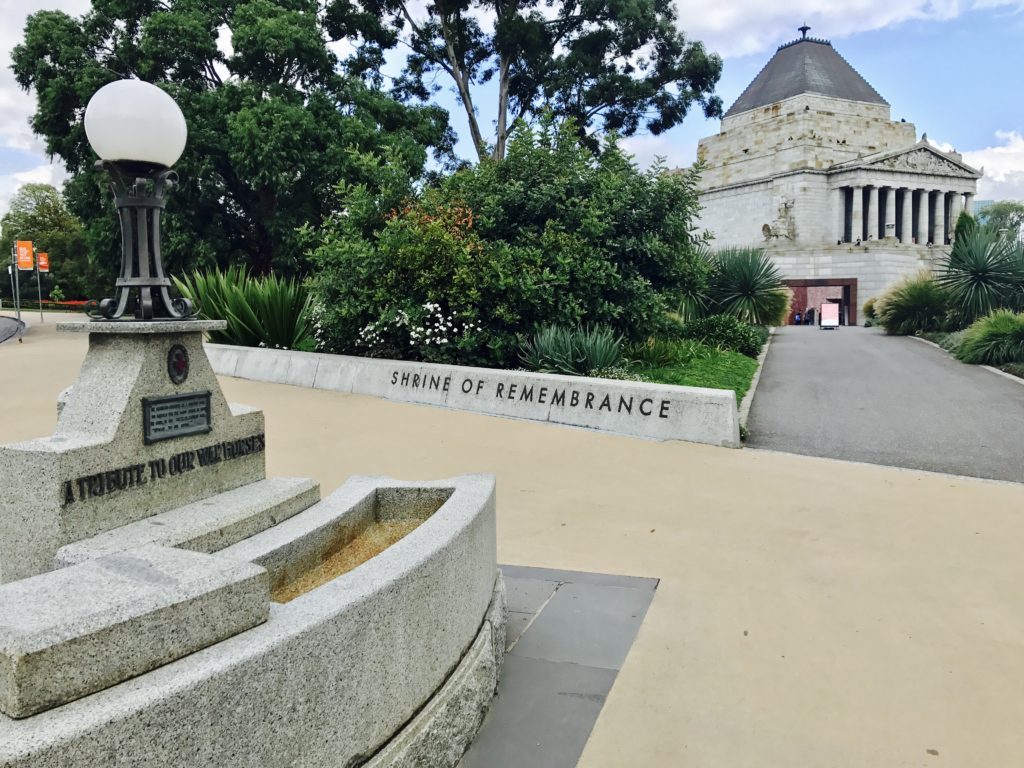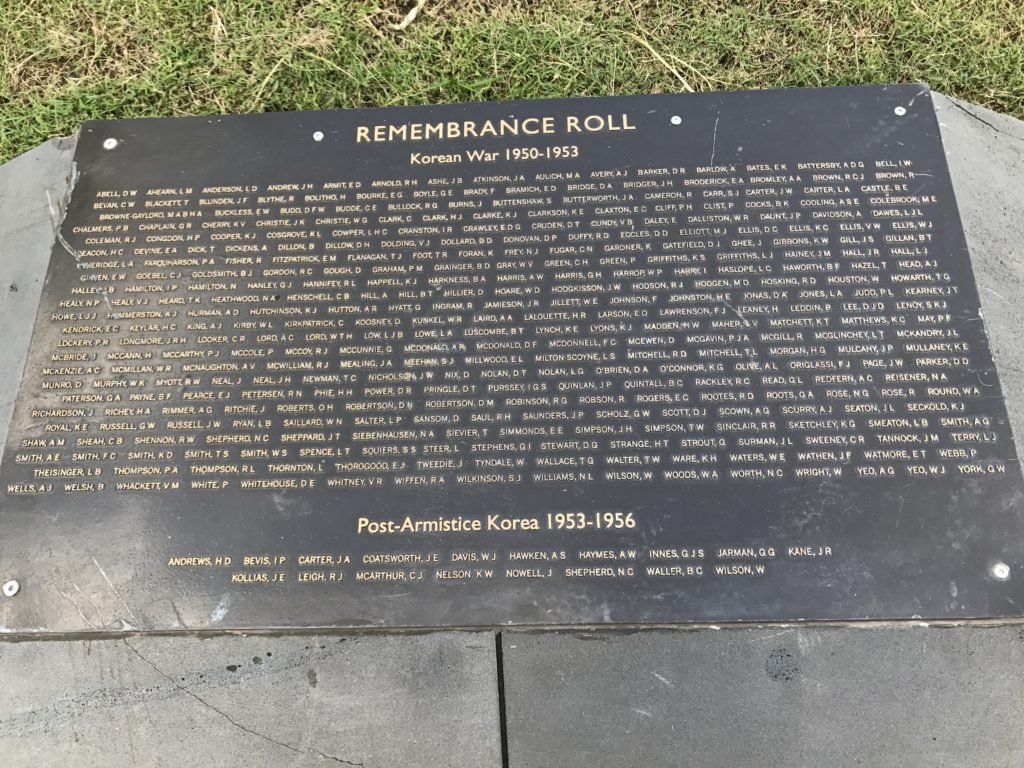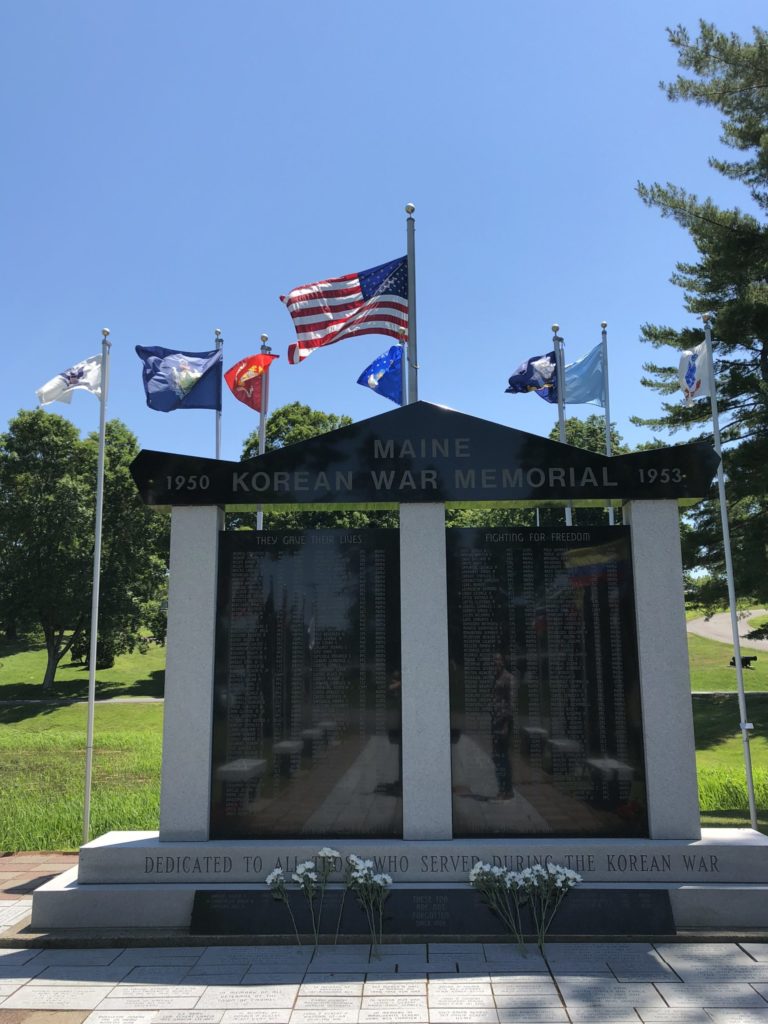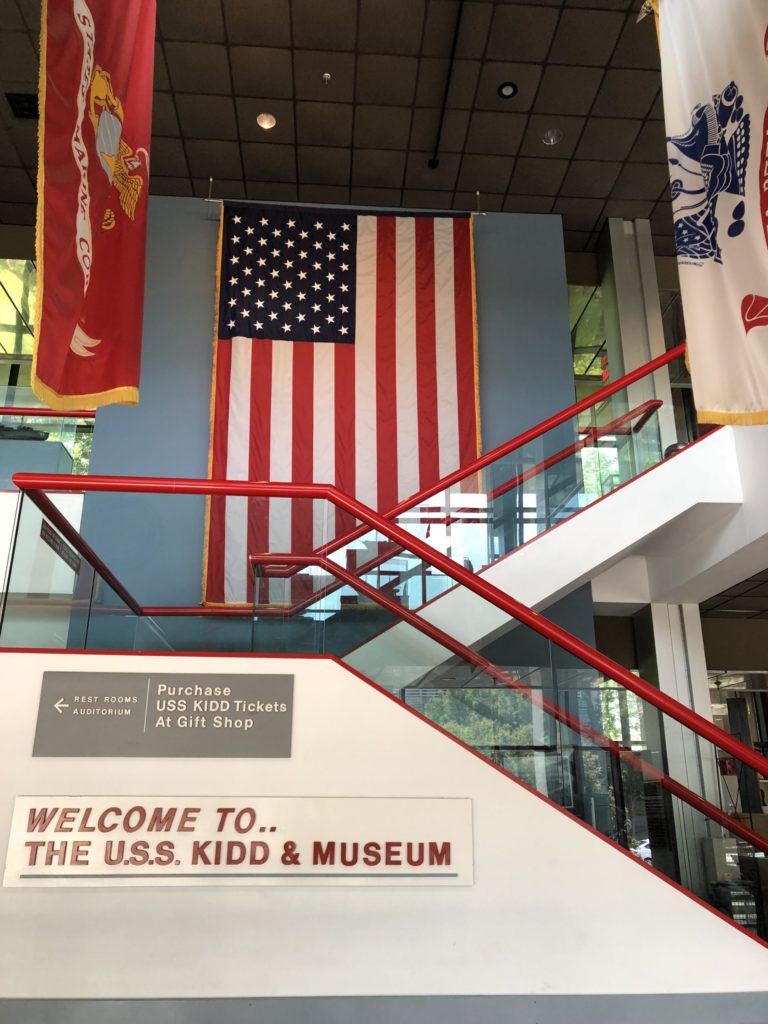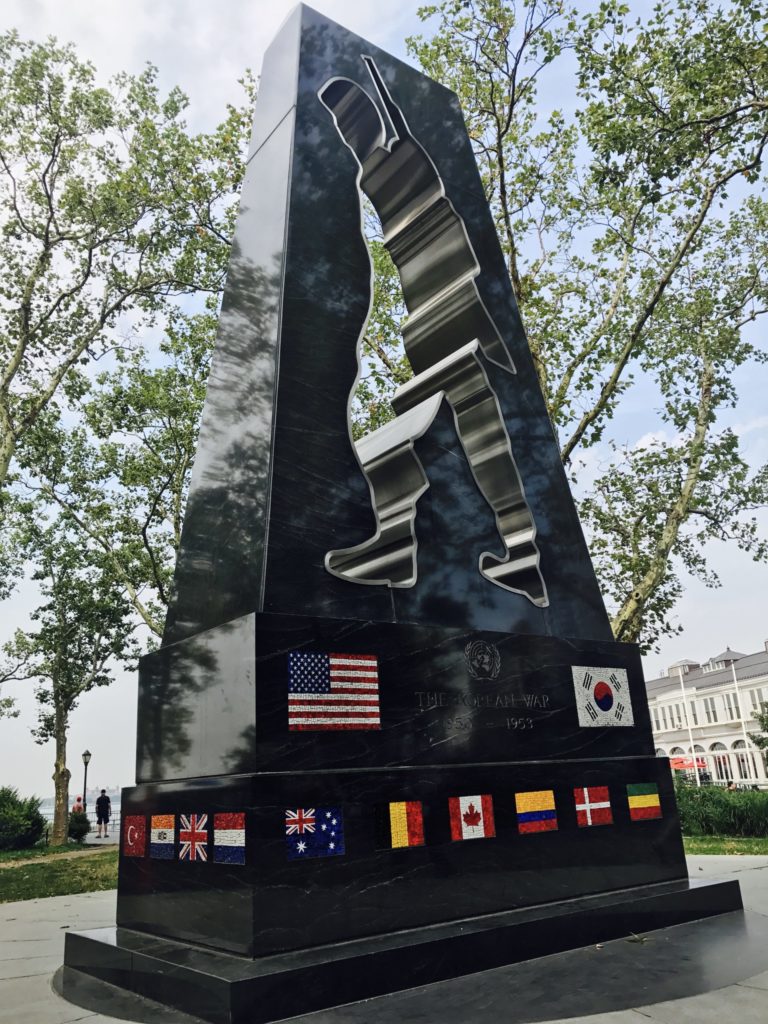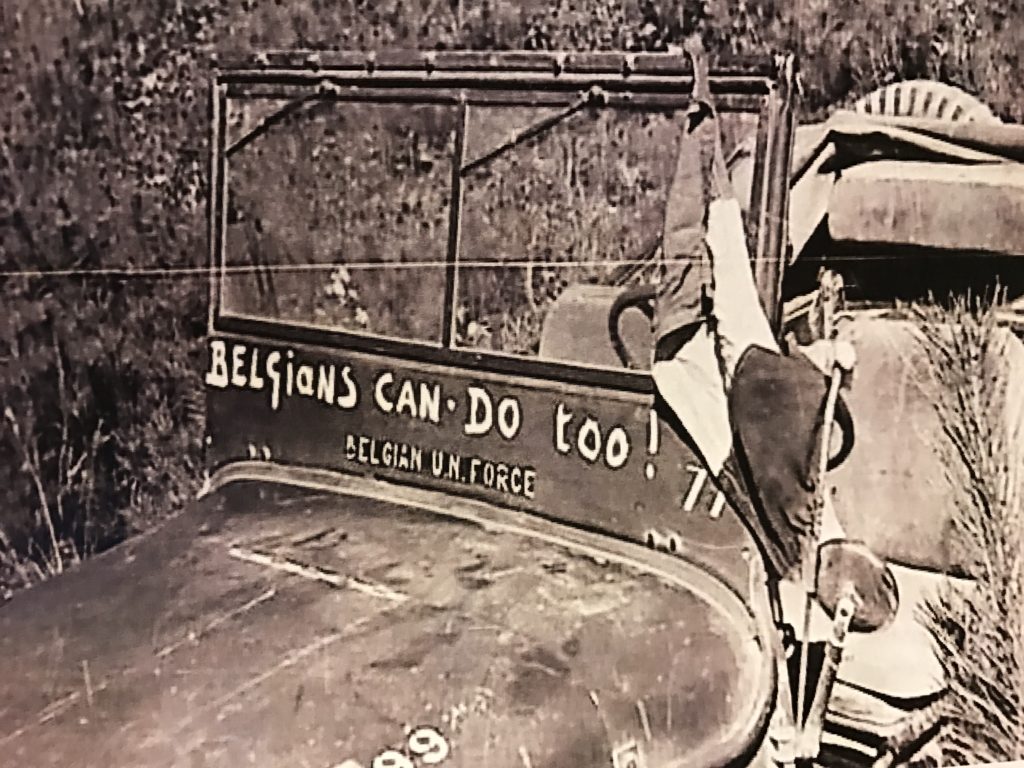Click on different countries and cities to explore Korean War memorials around the world!
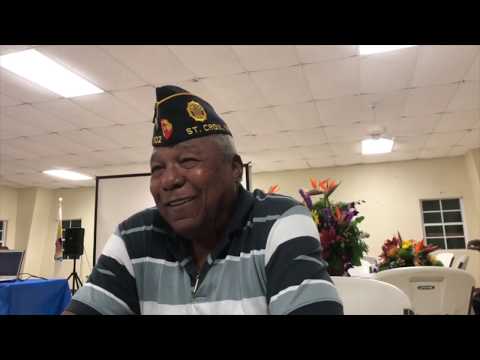
>> Okay, my name is Leonardo Ayala. I was born February 14, 1935, 1 more year older than he. Yes, [INAUDIBLE].
>> When did you volunteer?
>> I volunteer in … I think that was in January 1953, and they call me in March 1953.
>> Oh. That was right before the armistice was signed.
>> Huh?
>> That was before the armistice was signed in Korea.
>> Yeah, they were still in the war. Yeah, they were still in the war.
>> Mm-hmm. I … Wait. Why … Okay, so knowing that the war was still taking place, why would you volunteer?
>> That’s economics-wise because more work. I live in …
>> But …
>> I live in the island of Vieques. Vieques was small island and was a very, very poor island, and there wasn’t work to do. You would go to school, go away from school, and you can’t go to college because you don’t have the money to go to college, you don’t … You have … You find works and work around, so you have to go someplace. You either go to the state or either go to the army.
>> But that’s still different.
>> There was no choice.
>> But you’re still risking your life.
>> Well, yeah, but you have to survive. You’re looking for survival. That’s a positive.
>> Well, God must have blessed you so much because instead of sending you to war, he sent you to …
>> They sent me to Germany.
>> I know.
>> And I spend my whole time in Germany.
>> For how many years?
>> Almost 3 year. It was about 20 months, something like that. Almost 3 years I spent in Germany.
>> What was your service? What did you do in Germany?
>> I did infantry training.
>> Oh.
>> When they sent me to Germany, they check my MOS to Supply Specialist. They assign me to a supply company.
>> Actually, that’s very interesting. I like this interview a lot because most people think, “Okay, it’s war, so everybody goes to Korea,” but no.
>> No.
>> There were people serving in Germany, so right after World War II.
>> Yeah.
>> Not right after but soon after. There were people in other parts of the world, and they don’t realize that it takes a united effort to defend part of the army. So I’ve never … I haven’t really asked … I haven’t really heard from people who served during the Korean War in Germany, so can you tell us more about what it felt like being in Germany when you knew that a lot of people were fighting in Korea?
>> Well, in that year, in 1954 when I went to Germany, Germany was still under occupation. It was still in occupation for United States. So that’s what … We went as a occupation force. They still … United States was running Germany.
>> How many … How large was the unit or the people who were based there?
>> Well, I was assigned to the … I don’t know because they had so many bases in Germany, but this base that I was assigned was a supply company. All the part that the … All the vehicle, all the tank, all the … They need it there in Germany. They ship from the United States to Germany. I was stationed in [FOREIGN LANGUAGE], Germany. And so if they need a part anywhere in Asia or in Europe, instead of sending the part to the United States, they send the parts that are already in Germany. It was closer. It was a big, big, big, big supply, i think that supply is bigger than this down here, big supply. And then they had all kind of part in that supply.
>> Hmm.
>> So they don’t have to send something to the United States. If they need something for a tank or a truck or an airplane or something like that, they got them here.
>> Another question I always ask is, during the Korean War was when the army, military, was first integrated, right? Before it was segregated, and I ask many people what their experience in the military was like because even if the law said, “Okay, well, let’s” … “Puerto Ricans, they fought in a segregated unit.”
>> Yeah.
>> There was an all-Black army as well. So you were … Were you part of an integrated unit in Germany?
>> Yeah.
>> Did you face racism and …
>> No.
>> No?
>> No.
>> No?
>> No.
>> Really?
>> Really. When I was stationed in [FOREIGN LANGUAGE], no racism toward me.
>> Really? That’s …
>> I know that in United States, there was some kind of racism, racism, but none there. I talk about myself. I never was feeling that.
>> So other people in your unit, even if they were white Americans, they didn’t treat you badly?
>> No, mm-mm.
>> Wow.
>> Not in Germany.
>> That is actually a very encouraging thing to hear.
>> Yeah. Even when I … When my dad come to … When I wanted to enlist, I told them I don’t want to enlist. Even they … My company commander insists, [INAUDIBLE]. I said, “No. I don’t.” [INAUDIBLE] But I … Not in Germany.
>> So you left the service after 2 years?
>> Yeah.
>> And you came back to Saint Croix?
>> No, I was living in Puerto Rico at that time. I was drafted in Puerto Rico.
>> You were drafted in Puerto Rico?
>> Yeah.
>> What does that mean?
>> Well, they took me to the army, I was living in Puerto Rico. They take me to the army. I was living in Puerto Rico.
>> So you served in the army in Puerto Rico?
>> No, no, no, no, no, no. I took my training in Puerto Rico. They had training in Puerto Rico, and then when you take the training, they will ship you to the different place in the war. So when I completed my training, they shipped me to Germany. They ship some others to Korea.
>> Yes, but after, you could’ve come back home.
>> No, but my home wasn’t here. My home was Puerto Rico.
>> Oh.
>> Yeah, my home was Puerto Rico.
>> When did you come to Saint …
>> I was born in Puerto Rico. I was raised in Puerto Rico.
>> Oh, but you weren’t part of the 65th Infantry?
>> No, no, no, no, no. I was in the …
>> But you know about the Borinqueneers?
>> Yeah, I know about the Borinqueneers, yes. The Borinqueneers, yes, but I was not part of the Borinqueneers.
>> So when did you come to Saint Croix?
>> I come to Saint Croix … Let me tell you. My father moved here in 1952, and I came here in the same year, 1952. Then after that, 1953, I went to the army. When I came home from the army, I went back to school because when I went to army, I was only … I was in grade … was not high school. I had another 10 grades, so when I come home from the army, I went to fit in my high school. When I did my high school, I went to the state. I went to New York to live. And I stayed in New York until 1964, and that’s when I came to live here in Virgin Islands in 1964.
>> Wow. Do you still have family in Puerto Rico or here?
>> Yeah.
>> Both?
>> Yeah, yeah, both. And in the states, my daughters live in … I got two daughters and a son. My two daughters live in Jacksonville, Florida, and my son lives in New York.
>> Oh. Where in New York?
>> In the Bronx, New York.
>> Yeah. And you go visit them, huh?
>> Oh, yeah. I was there last year. And this year, I went to Jacksonville, Florida, to visit my daughters.
>> So between New York City, Saint Croix and Puerto Rico …
>> Puerto Rico, yeah.
>> … you like where best?
>> Well, I never complain about Saint Croix. I got no complaint about the state of what I was living in. Whenever I go, [INAUDIBLE] I don’t feel no homesick or anything like that.

– We were fighting in Korea. They’re doing a Korean Wonsan. The city’s infantry saved the American regiment. The Marine. For when the… came, they had to from Hungnam to… road. To go to the way because there were too many Chinese. They had to go the other way. They stopped the Chinese… the American gave into the war.
– Who fought in the, uhm, Hungnam evacuation?
– ¿A dónde?
– Fue que en el 50.
– ¿En el 50?
– …tuvo que agarrarle.
– En el 50 estaba allá.
– I went in 1951 until 1953. I went to the Geochang course. I go to different companies. I was the battalion company. Company I, second platoon, second squad. In Korea. Everynight… And I was the Army… with my company. Combat payment. Make the patrool everynight in Korea. Papas… She was my. Too much mine. Explosion.
– ¿Usted fue un policía militar?
– I was infantry over there.
– ¿Qué recuerda?
– ¿Qué recuerdo, qué recuerdo de allá? I was in the attack in… hills. Maybe you don’t remember.
– No.
– In Kelly mountain of Kelly hill. We fight over there in the mountain for three battalions. First battalion, second battalion and third battalion. First battalion about all the… battalion. Not all complete. Too much died. Killed. Too much killed over there in the mountain, and the second battalion, killed too. And the third battalion,… my captain said, “Two more dead, two more injuries.” So, we go to the mountain down.
– ¿Qué es el nombre de la batalla?
– Kelly hill. Three battalion. Right over there. – ¿Dónde?
– ¿Dónde fue esta batalla?
– En Corea.
– Sí, sí, sí, pero ¿el sur o no?
– I don’t remember the… You know. I was a debutant.
– Sí, sí, sí.
– In Kelly hill. The mountain is Kelly hill. The mountain.
– Korea Hills? Kelly?
– Kelly hill.
– Kelly hill. K-E-L-L-Y.
– Kelly hill.
– Kelly?
– K-E-L-L-Y.
– Kelly hills.
– Kelly hills.
– Yo estudiaré. ¿Sí?
– Sí, sí, sí. Y ¿qué, qué piensa usted de regimiento 65? De la legacía del 65.
– 65 pelió mucho allá en Corea y batalló mucho allá, mucho, batalló mucho.
– Muchísimo, ¿no?
– Mucho, muchísimo.
– ¿Por qué?
– I don’t know. The enemy took…
– ¿Cómo se llama? El terreno.
– Sí, sí, sí.
– El terreno. The mountain, the land, everything. The enemy took the…
– ¿Ustedes piensan que el general…?
– El general Cordero.
– ¿Qué?
– General Cordero nos metió allá.
– ¿Cordero?
– Cordero. Sí. General Cordero, eh…
– Three battalions. He make one… meeting in the yard over there. You can take the mountain in… You can take it. The mountain, the… You can take it. …the mountain. What? Okay. We go over there. No good. Too much dead. Too much injured. Too much killed. In the mountain, Kelly was the… Mongolian. Big one. The Mongolian and Chinese and Korean. North Korea stays over there too.
– Pero el regimiento fue segregado, ¿no?
– When we go back from the mountain the other day. We’re going to take the low weapon in the mountain. Too much weapon. And looking at the injured, the dead, too much people. Too much soldiers dead.
– Pero, pero el regimiento 65 solo, solo puertorriqueños, ¿no?
– Puertorriqueños, sí.
– Sí.
– Eh, después más tarde nos…
Attachment American soldiers in different company, Puerto Rico. Over there in Korea. The company… in different company attached the captain, the lieutenant to take out the…
– …eh, esto de, ¿cómo se llama? De que… los que… que venían de allá.
– Officer, American officer, attaching different companies. Attached my company, one American captain, I don’t remember now the name, he not believed me Puerto Rico. The American don’t believe me. The American captain don’t believe I’m Puerto Rico. When he go to the patrol and the scout take… the captain over here, this way. And the captain, I remember, because the captain said, “No, you have it the wrong way!” Company over here, this way. I don’t know. He walked to the patrol to the recognizant patrol, the enemy is approaching towards mine. I’m a soldier… Sergeant Rodríguez from… Puerto Rico. He exploded dead to the mine because the place is too much mine, you know? I remember the… I pictured it in my mind.
– Guao.
– Yeah, every…

[habla en coreano]
– Poema, un poema dedicado a las mamás de quienes tienen…
– Hijos.
– …hijos que participaron en la guerra.
– En la guerra.
– Sí.
– Sí. Ya.
– Anita me pidió que recitara esta poesía, yo se la regalé a ella y le voy a regalar también el libro que escribió mi mamá cuando yo estaba, eh, de poesías, ella escribió. Pero la primera poesía que está en este libro es la que dedicó a todas las madres que tenían los, los hijos en la guerra y esta se la dedico a mi querida nieta Anita con, de Corea de su abuelo boricua Josué.
– Gracias.
– Dice mi mamá de la siguiente manera, una plegaria que ella compuso en forma de poesía pidiéndole al Señor que preservara mi vida y que no permitiera que yo, con mi arma de reglamento, matara a ningún semejante y decía ella de la siguiente manera: “Señor, ¿qué te daré si me traes a mi hijo, Señor? Que se han llevado a la guerra maldita, aquel infierno. Señor, ¿qué te daré? Si nada tengo, pero tú eres bueno, Señor, y guardarás su vida. Señor, ¿qué te daré? Yo nada tengo que te pueda ofrecer por su pronto regreso. Señor, ¿qué te daré? Si mi alma está triste, muy triste, y nada soy y nada puedo. Por las noches, Señor, sin querer me desvelo, por el día, Señor, al infinito vuela mi pensamiento para pedirte, Señor, que cuides a mi hijo, que está lejos, muy lejos. Señor, yo le enseñé a mi hijo las sublimes palabras de tu santo evangelio, donde el amor nos une en vínculo perfecto, haciendo una familia de este gran universo, que los… Señor, eran sus hermanos buenos, la raza amarilla, los blancos y los negros, sin distinción ninguna, teníamos un padre bueno y ese padre, señor, eras tú, amante y sempiterno, que tú eras padre amoroso, sublime y tan tierno que, por salvar al mundo, enviaste de su gloria a Jesús, el, el Dios, el, el unigénito. Señor, se han llevado a mi hijo, a mi hijo, Señor, que es amante y muy bueno, para enseñarle, Señor, a matar a sus buenos hermanos de este gran universo. Señor, mira mi angustia y oye mi ruego, permite que mi hijo, Señor, que es tan bueno, no use su espada para matar a su hermano, el cual tú has hecho. Señor, permite que allí tú estés en medio de ellos, protégele sus vidas, pues, son tus hijos, cuida de ellos, en ti yo espero, únelos con tu amor inmenso y del campo de batalla, Señor, que salgan ellos para proclamar el amor de tu santo evangelio. Señor, yo te imploro que cuides a mi hijo y también te pido, Señor, que cuides de aquellos que dicen que son malos, pero yo no lo creo, ellos tienen sus madres, que llevan en sus pechos el amor de sus hijos y el corazón deshecho. Yo sé, Señor, que tú los amas como amas a los nuestros, son tus hijos, Señor, unos y otros, tú eres nuestro padre y padre de ellos. Señor, haz un milagro, yo nada te ofrezco, pues, nada tengo, pero, Señor, haz un milagro, trae la paz al universo, en cambio, las madres de este mundo te ofrecemos lavar, no ya tus pies, sino todo tu cuerpo con lágrimas cristalinas que salen a raudales de nuestros vellos. Dios les bendiga.

– Pero mis tíos fueron a pelear también y donde yo peleé, pelearon ellos, uno de ellos murió en mis brazos, lo enterré y regresé de nuevo, pero yo sé lo que es un hijo cuando está guerreando, cuando se manda a sitios a pelear, donde uno ha estado pasando… Y pasando malos tragos en la guerra. Así que yo también siento como padre y como hijo, siento como hijo porque sé lo que sintió mi madre, sintió mi padre cuando yo partí.
– No.
– Y nosotros, nosotros apreciamos todo el esfuerzo que hacen por nosotros, somos, fuimos soldados y somos soldados porque el soldado una vez sigue siendo soldado todavía, pero siempre hay alma.
– Sí.
. Hay agradecimiento y amor. Okay.
– Y gracias muchísimo, padre.
– And there’s a picture…

– Mi nombre es Carlos Josué González Mercado. Todo el mundo, las amistades y mi familia me dicen Josué porque mi papá se llamaba Carlos. Y antes de yo ir a Corea, trabajaba con la autoridad de Energía Eléctrica, y estaba a cargo del pueblo de Río Grande. En aquella época los pueblitos eran pequeños. Río Grande tenía 400 abogados y yo estaba solito a cargo de ese pueblo, pero empezó la guerra de Corea y, a pesar de que ya yo tenía 23 años, fui llamado obligadamente a servir en el ejército de los Estados Unidos. Recibimos entrenamiento en el campamento de Tortuguero en Vega Baja. Y a los 3 meses de recibir el entrenamiento zarpamos para Corea en un barco que se llamaba Sargent… Viajamos de aquí a Panamá. Cruzamos el Canal de Panamá. Llegamos a California. De California seguimos a Hawái. De Hawái llegamos a Japón. De Japón definitivamente llegamos a Corea un mes después. Salimos de aquí viernes santo de 1951. En Corea me asignaron al 65 de infantería como uno de los primeros refuerzos que fueron al 65. Había otros tres regimientos americanos, dos regimientos más americanos. Era el 7 y el 15, pero el único regimiento que era de puertorriqueños solamente era 65. Era un regimiento segregado de solamente puertorriqueños. Bien, naturalmente, nos unificó más como pueblo, como amigos, como compañeros, porque al fallecer uno nos dolía a todos. Y fue un año completo en que estuvo en la guerra de Corea. Si ustedes me permiten dar un testimonio de la grandeza del Señor. Mi mamá, cuando yo fui a Corea, hizo una plegaria pidiéndole al señor que no permitiera que yo con mi arma de reglamento matara a ningún semejante mío, una petición que para cualquiera es imposible porque a nosotros nos adiestraron para matar, para matar gente, y pedirle a Dios que un hombre que lo mandan a matar gente no mate a nadie eso es una escala muy alta. Ella también le pidió que preservara mi vida. Y durante ese año que yo estuve en Corea, al yo llegar, perdóname, al yo llegar a Corea, el comandante de la compañía donde yo estaba, vio mi récord y decía que yo era lineman, procurador de líneas, que tiraba líneas, conectaba teléfonos, y hacía instalaciones, y hacía bregar con los switchmodes. Y dijo al sargento: “Este es el hombre que necesitamos para conectar los teléfonos de la compañía de regimiento”. Y mi trabajo en Corea, donde un año, por un año fue conectar teléfonos y operar swichtmodes. Por lo tanto, mi mamá no puede testificar si yo maté a nadie, pero yo sí puedo testificar eso porque debido a ese trabajo que tenía, de mi rifle no salió ni un solo tiro, o sea que no pude haber matado a nadie. Y hay que darle gracias a Dios. Por esa oración de mi mamá que le pidió a Dios eso, y Dios oye a los corazones contritos y humillados que se doblegan ante… Por eso yo donde quiera que voy, y me preguntan, doy mi testimonio de la grandeza de Dios que me permitió regresar con vida sin tener que matar a nadie y servir en el ejército sin tener que cometer ese roll.
– Sí.
– Dios me los bendiga.
– Sí, sí. Gracias, gracias… Su Abuelo es un pastor, ¿no?
– Mi papá.
– Papá. Yo también.
– Este es mi papá, mi mamá, 9 hermanos.
– Oh, my God! 1, 2, 3, 4, 5, 6, 7, 8, 9?
– We were 10, but one died very old.
– Where are you?
– I am the 3rd one. That’s the oldest, 2nd and the 3rd. This is 4th, 5, 6, 7, 8, 9.
– Wow, bueno, el señor da a su familia muchos, muchos…
– Todos, toda la familia sirve al señor, toda la familia. Mi papá y mi mamá nos enseñaron a amar a Cristo por…
– Gracias.
– Esta fotografía fue tomada cuando mi papá y mi mamá cumplieron 60 años de casados.
– Wow, 60 años. Gracias muchísimo.
– Dios la bendiga.
[HABLAN EN COREANO].
Thank you.
[HABLAN EN COREANO].
– …
[HABLAN EN COREANO].
– Which battle did you fight?
– … una pelea, ¿verdad? Estaba encargado solamente de…
– No, no.

– My name is Carlos Pena Lozano. Okay. I went to Korea in 1951. I landed in Incheon through Yokohama on a small boat. We have sweet water at [—-] and saltwater. And we were to Incheon. The port of Incheon was in flames. I was a kid. 17 years old. I guess most of the kids in this island joined the army on those days because [—-], and it was showed to the world. So we went to the [—-], up on the mountains. I got wounded there. I shot two times. I [—-] the [—] river, and we got frozen. [—-] the Chinese. And you know, they started firing at us and everybody ran. But after that, a few months later, I was shot in [—-]. They said I was dead because I dropped in a creek, a frozen creek. The next day, a Korean peasant saw me and I was almost dead. They took me on a helicopter to Gimpo, to our base. I found out later that the Puerto Ricans operated me, and from there on, I was sent to Japan for recovery and to the States. Later on I ended up on Panama, and I got discharged.
– I heard that you went back to Korea last year.
– Oh, yes. Yes. I would like to thank the people of Korea, the government, all the people there that treated us like, you know… I don’t know if we deserve that kind of treatment. Even my wife cried the day all those Korean officials came to greet us, and I was never treated better in my life anywhere like in South Korea. People are marvelous. I guess [—-].
– Well, you should’ve been treated like that, because we, the Korean people, are here because you fought there, you know? I wouldn’t be here if you didn’t fight there.
– I’d also like to thank [—-], real Korean people that, you know… [—–]. We never had that recognition we had, you know.
– Well, you should be proud.
– Oh, yes, I was proud that I went to South Korea and I met nice people.
– Thank you so much.
– I guess everybody in the 65th infantry regiment have all the Koreans in our hearts. Yes.
– Thank you. That’s so sweet.
– The first thing that comes to mind.
– The people. The people.
– And what kind of people are they?
– Fantastic. They are nice people. Nice, nice. I guess that every time that I travel and go anywhere, people would do… [——] in South Korea. I’m talking for all the Puerto Ricans that have gone there, and I guess everybody that’d been there, so it’s your people. Really good.

– 2004, ¿no?
– Un poco…
– Más alto.
– Sí.
-Doménico Adorno.
– Sí, cuando, cuando, ¿participaron en la guerra?
– Nací en el pueblo de Trujillo Alto. A los 21 años fui reclutado por el ejército. Me enviaron a su país, Corea. No tengo buenos recuerdos. LO que tengo es un sentimiento porque muchos han ido ahora y dicen que Corea está muy pero muy alertada, muy avanzada, pero todavía en mi vida no capto, todavía yo tengo a Corea de 66 años atrás. Yo estuve en Chon todo el tiempo. Estuve en una oficina del tercer batallón. La oficina pertenecía al 65 de infantería. Estaba localizada en una universidad que había sido destruida por los americanos para sacar al enemigo, a los coreanos… metidos. Tuvieron que bombardear ese edificio. En ese edificio había partes que se podían usar, y ahí estaba yo en una oficina. Yo estuve 13 meses, un año y un mes. Mi trabajo allí era que me enviaban el informe, informe todas las mañanas de los muertos, de los desaparecidos, de los heridos durante la noche del cuerpo del 65 de infantería. Había mucho conocido mío. Todos eran puertorriqueños. Para mí era un dolor, aunque no los conociera físicamente, pero eran mis compatriotas. Eso es un dolor que llevo, ¿entiendes? Porque todavía conozco descendientes, descendientes de esos muchachos que perdieron la vida allí. Cada vez que los veo me traslado a Corea. Esa es la parte primordial del viaje a Corea. Bien, tengo otros recuerdos mucho más tristes del pueblo coreano.
– ¿Visitó a Corea el año pasado?
– No.
– ¿No?
– No, voy a visitarla.
– ¿Vas, vas visitar el mes de septiembre?
– Sí.
– Ah, ¡ok! Sí.
– Pues aquel tiempo ustedes no habían nacido.
– Sí, sí, sí.
– Fue un tiempo triste para Corea. La guerra destruyó la manufactura, destruyó la agricultura, y Corea vive… de la agricultura, de la pesca, bueno. Recuerdo, por la tarde cuando yo salía de la oficina, se había todo empolvado porque los edificios son hechos de un material, no recuerdo ahora, que es como tiza. Salía afuera. Había un, una reja para no entrar al edificio donde estaba la oficina. Nosotros pegábamos allí… y eso… triste ver cómo las mamás…
[HABLAN EN COREANO].
– Sí, sí, sí.
– Lloraban pidiendo comida, y muchas veces hacían cosas indebidas, cosas indebidas con sus hijos. Yo tengo mis hijas ahora, mi nieta, y eso me lleva, ver un pueblo destruido físicamente…
– Sí.
– Y moralmente.
– Sí, pero ahora es muy…
– Eso es distinto, pero yo no lo he visto.
– Sí. Gracias.

– My name is Domingo Pelliciel. I was in Korea in 1951.
– Look at me, look at me.
– Not the camera? Oka, my name is Domingo Pelliciel Febles, and I was in Korea in 1951. When I went to Korea I was 21 years old. We landed in Incheon. In Incheon, the ship [—-] stayed out the [—-], and then we go out through [—-], down to the small landing boat to the shore. From there, we went into the train. That train had [——]. There were two trains, one go in front and one in the back. So we went to Seoul. From Seoul we went to the frontline. [—-]. I was witrh the 63rd infantry regiment [—-], rifle man. And in Korea, I thought that was in the end of my life. I was in combat over there, with the infantry, and [—-], one time I was on patrol, and then the American airplane was bombing the Chinese, and then they thought that we were North Korean or Chinese, and they came to us. To bomb us. So I have a piece of cloth. This color. Yellow. And red. So the captain said, “Open the cloth.” So I opened it and the plane went out, because that showed that we were friendly, we were no enemy. So they went out. Another time, while I was in Korea, I was on [——], I saw a lot of people moving in the back, but to [—-], so I took a hand grenade to throw the hand grenade, and behind me there was a piece of… maybe a tree, and it my hand. So they hand grenade went out, so [—-] in the hole, so I jumped inside the hole. I jump, and then… If I stay up, my face would’ve disappeared from my body. One time, I was doing a hole up on the hill, and then, when I was doing the hole, there was snow, and the snow jumped, and the Chinese… I don’t know if they were Chinese or North Korean, they were watching me with binoculars. And then… I hear the mortar come to me, and I started to run so I go in the ground and start rolling like a boulder down the hill, so thank God. If I stayed up, they’d keep shooting me, but when they see me falling through the ground they stopped shooting. One time also I was with my friend, who was laying a barbed wire, and then the wire hit the fray, when you hit the fray it lights up, and the wire hit the fray, and the Chinese, Chinese or North Korean, I don’t know, they were looking and started shooting with the mortar, and my friend was wounded in the back. So thank God there was a hole in front of me. I jumped in the hole and they shoot my friend like 3 or 4 times. My friend was my Corporal. He was with a Korean soldier, a Korean company. They called it rock, right? Yeah, with a Korean company. So we had to translate from Korean to English, so we had Korean in the company.
– You remember his name?
– [—–].
– Amazing that you can remember them. Did you ever meet them?
– No, no.
– Maybe…You’re going to go to Korea next month, maybe you could find them.
– Maybe I find them. Maybe they’re dead right now. Maybe. who knows.
– No, maybe not!
– It was many years ago. It was 1951.
– That would be wonderful if you could find them.
– One time we were on patrol, and we walked, walked, walked, walked, and then the guy said, “[—-] we have to find the company. Please go back to the company.” So the… I’ll say the enemy, because I don’t know if they were Korean or Chinese. They were waiting for us. So this is the gate. we’re walking, so we stop over here and we say, “let’s go back.” and they started shooting with machine guns. They’re waiting for us to be right in front of the machine gun to start shooting.
– Did you get wounded?
– No, thank God I didn’t. Thank God, because my mother was praying for me. She was praying to Virgin Mary and Jesus. To Jesus. Saint Jesus. I went to Laos…
– GRACIAS A DIOS…
– They’re shooting, but I came out alive. Also, when I was on patrol, we used to see a little paper with [—-] propaganda, propaganda like writing in the paper, and the paper said [—-], “Go back to your country. Your family is waiting for you. Leave Korea for the Koreans.” In the paper. I used to look at the paper and say, “Oh, my God.” They have a soldier dead on top of the barbed wire. [—], “down.” but, forget about that.
– I’m so excited you’re going to get to go to Korea for the first time, right?
– When, now?
– Next month.
– No, second time, because I was there.
– Oh, second time!
– No, no. First time I was in combat.
– Oh, yes!
– Now I go for pleasure.
– Yes. I’m excited for you.
– I go for pleasure, for that time I was in combat.
– I’m so excited. Maybe I can meet you there.
– Oh, I hope so. I hope so.
– Yeah. Okay. What do you want to say when you go to Korea?
– Thank you, Koreans. Thank you.
– No! We thank you!
– Oh, yeah. Me too, me too.
– Why?
– You say it to me, I say it to you too.
– You don’t have to thank Koreans.
– No?
– No. We thank you, right?
– Well I say welcome. You’re welcome. You know, i was in Korea, I was in the hospital, in [—], in the hospital. From the frontline I went to sea, and they put me in the hospital, and the nurse was Korean. She shaved me, washed my face, my arms. Then [—], I keep sick, so they sent me to Busan.
– Swedish Field Hospital.
– Yeah.
– You went to Swedish Field hospital?
– There was a ship, a big ship.
– Yolandia.
– Yeah. In Busan. How do you say, Busa or Busan?
– Busa.
– We say Busan.
– Busa. You went to Yolandia, the ship?
– Yeah, I think so.
– Cool. I went…
– It was a big ship. [—-].
– I visited the Danish veterans.
– Oh, yeah?
– Yes.
– But that was their ship?
– Yes, Yolandia.
– Yeah. It was in the port of Busan. Right there. So I stayed there for one week, a couple of days, then they sent me back to the frontline.
– GRACIAS A DIOS, GRACIAS A DIOS ESTOY PORQUE DIOS LO QUISO ASÍ.
– Thank you. I pray that you will continue to have a lot of…
– Also, I have a friend of mine, rest in peace, his name was Pedro [—], from Puerto Rico. He was in Korea for 13 months. They told him, “You go back to Puerto Rico.” in for days. So one night we had to go on combat patrol, on combat. And then he said to the captain – the captain was American – “I’ve been here in Korea for 13 months. You [—-] the company, so I can go back home.” He said, “I don’t care how much time you’ve been in Korea, you have to go to fight. You’ll stay in the company.” And we went to combat, and he was killed. One bullet in the chest.
– Well, thank you so much. I’m so glad you are not…
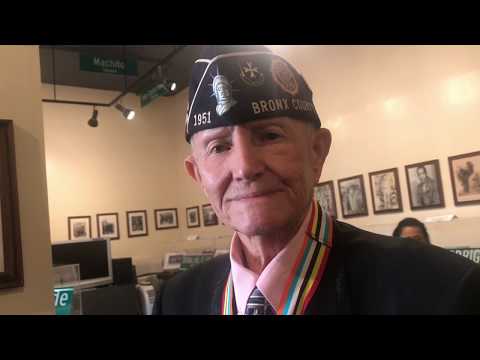
[HABLA EN ALEMÁN].
– English.
– Okay, this [inaudible] says, “Welcome to the 65th Infantry Regiment.” This insignia here [inaudible]. [Inaudible] everybody, because the Puerto Ricans, our 65th infantry was [inaudible], and it’s still commemorated for the Korean War. And let me tell you, I talked [—–]. After 50 years, I went back to Korea, and I was so happy, because Korea today looks so [——]. [inaudible]. [inaudible[, and are waiting for people to remember us and talk about the 65th infantry regiment. It was amazing. I feel so good we have this display here. [inaudible]. It is me. And I’m proud to be a Korean veteran. And to the Korean people, Salaam-Alaikum. [Inaudible].
– … of us, you know. We’re so grateful to you as well, you know? I’m so happy you said that we [—–].
– God bless.
– Thank you.
– Anita?
– Anita, my granddaughter.
– ANITA. SÍ, SÍ, ANITA, SU NIETA.
– MI NIETA.
– SÍ.
– COREANA.
– SÍ.
– QUÉ BUENO.
– So, snow… I have, because [inaudible] in the United States, but we had two enemies. The enemy and also the snow, because it was really, really cold, and some of our men had to be amputated, because they got gangrene for the cold. And I tell you, it was terrible. But we made it, and, some of them… we have the man in Puerto Rico, who’s half maim. We had to amputate his legs.
– Frost bite.
– Frost bite, yeah.
– How many died, how many were killed in action?
– Wow. Too many.
– 70%.
– 70%?
– 17.
– 70. 7 – 0. 70% of the Puerto Rican heroes were killed in action.
– 70?
– 7- 0.
– My uncle, which was a soldier with the 65th infantry.
– How many…?
– I’ll look it up.
– 70%.
– But the round number… 70%.
– The funny thing is about my uncle, we never found out what happened to him, because…
– He’s MIA?
– I don’t know if he was a prisoner of war, but we never found his body.
– So he’s missing in action.
– Of course. As I already said, I’m going to dedicate my life for our veterans, because I miss my uncle.
– The records’ keeping at that time, remember…
– I know.
– There was a language barrier.
– I know.
– So… and there was a war going on.
– And there aren’t…
– So records got lost.
– And because the war hasn’t ended, you know, it’s difficult to identify the remains, or retrieve the remains. And so there are 8000 MIAs, POW in Korea, which is… you know…
– There might be some alive, but I doubt it, cause it’s such a long time. But I hope one day… they’ll return all these people to us. [—-].
– It’s something that’s very dear to my heart, so… Because the families will never know what happened to them.
– No closure.
– Yeah, no closure.
-Okay, my name is Thomas Lopez. I’m Puerto Rican, of course, and I’m part of the 65th infantry regiment. And let me tell you, they call me a hero, because [—-] the 65th infantry complete. [—-], because [—-] in Puerto Rico, they sent me some kind of… like a plaque, considering me a hero. It was not only Tommy Lopez, it was all the 65th infantry, represented. And when I went to Korea of course I’m going to talk about the cold, because it was really… the Puerto Rican, we’re not used to that kind of weather, and we had two enemies. The enemy and also the cold. And as a matter of fact, we have people, as I told you before, that became… A man in Puerto Rico that was half a man, because we had to amputate his whole legs. And a lot of them suffered the cold. [—-] being an infantry man, because we had to communicate in English, in Spanish. They sent me to school in Seoul, and I learned communications in Korea, and when I went back, I was [——-] for the big, big, big [—-] in charge of the 65th infantry regiment in Korea. And that made me feel so proud. But I’ll never forget those who still were fighting in Korea, because they were my people, and as A Puerto Rican I love [—-]. And thank you, thanks to you, Anita, because you make me feel so good, so happy. I wish you to continue learning with the 65th infantry, because we have to recognize [—-]. Personal recognition to Anita [….], thank you so very much. God bless. Okay, first of all, we should go up to the schools and teach our kids about the 65th Borinqueneers. A lot of people don’t ever recognize, no, when we’re in Korea, and in this personal memories that I still have should be distributed within the kids, to have an idea what it is to defend this great country, which is America. It’s my country too. I was born in Puerto Rico, but I became a citizen. When I was born in 1917, it was tough to be citizen, because we used to belong to Spain, and when they came to… the war between America and the other countries, we became citizens. [——] made us citizens. So I’ve been a citizen all of my life, since I was small, that’s right. But there’s one thing I’ll say. There was a smart kid [—–] and lifting the flag. There’s the [—-] reason the Puerto Rican flag, and wherever place I go, I make sure I take my flag too, because it represents the 65th infantry, the Borinqueneers. And this is why I want the kids to learn and to know the history, and love this great country. First, I’ll say thank you to the Korean people, because I love you. And also, such a big change made me feel so proud and so clean about Korea. The people dress so nice, everybody, [—-] people. And of course, [—-] before, we did the other… [—] and many evangelistic churches, and we’re happy we had a chance to some of them. [—–] was so happy that we were there.
– Well, you deserve to be treated like kings.
– Thank you.
– Hi, thank you, Hannah. Yeah, so, the 65th infantry regiment of Puerto Rico fought in every major campaign of the United States wars, from World War I to World War II and Korea. But they distinguished themselves during the Korean conflict. The Korean conflict was 3 years. The Puerto Rican regiment was a regiment sized military unit. So, they fought in 9 major campaigns, from the battle of the chosen reservoir, where they were the frozen chosen, to the evacuation of Hungnam, and most famously was the bayonet charge of February 2nd, in 1951, where 2 battalions of the regiment encountered the Chinese 149th division. Now, a division is made up of 10,000 men, and a battalion is made up of approximately 1,000 men. So, there are your contrasts. So the numbers were basically, you know, 10 to 1, right? 100 to 1. So they fought valiantly for 3 days. They fought so valiantly, that the order came down to fix… the order came back to fix – the memories came back – the order came back to fix bayonets. The bayonet was fixed to their rifles. The order was given to charge, and they fought almost basically hand to hand in a very ferocious battle. As the culmination of that battle, there was the sound of a bugle. The bugle sounded withdrawal. It was the sound of the Chinese bugle, which called their units to withdraw. Now, there were 7% casualties. They left no men behind. They brought back all of their wounded. They brought back the story of what occurred to their commanders, the commanders brought that back to us, and now we bring that story back to you. So, as a culmination of that distinction, that gallantry in the field of battle that even the enemy had to bow in respect to this kind of worthy opponent. So it took us approximately 65 years to bring attention to… the military, where they had to prove themselves, they had to contend not only with the elements and with [—-], but with a ferocious enemy. They proved themselves time and again in their ingenuity, in their gallantry, in their bravery in battle. And then even after such, here, 65 years later, I gather together the remnant of these veterans to be in the 65th infantry on a task force, to help educate the public, help educate the congress, to help bring attention to their magnificent story to the American landscape, which culminated in the award of the Congressional Gold Medal, which is the highest award that the people to the United States can give any military unit. and in their gratitude as well, the people of Korea, and the government of Korea, awarded each of the Korean veterans this friendship medal, and also the Ambassador for Peace medal, so…
– Smile! Look here!

– I’m your master of ceremonies during this event. We gather here today to present a flower wreath in honor and gratitude by… to the fallen soldiers of the Korean War buried and memorized in this cemetery, and to thanks the family members for their sacrifice. Please, stand up if you can. For the… in honor of our fallen heroes.
Please, be seated. We would like to thank the presence of Mr Glenn Power, deputy undersecretary of the. President of the Korean-American association of Puerto Rico. Member of the Remember 727 Organization for Korean War Veterans. Ms… President of 65th Infantry veterans. Member of the 65th Infantry divisions were engineers, family members. And now we have Mr. …. director of the Puerto Rican National Cemetery with a short message.
– I’m going to… I didn’t know I had to give a short message. But another things, uh, thanks him for actually taking time and making this possible. I’m very proud of the 65th Infantry … for their service in Korea, World War II and other places. They went to Panama, all the places that they served. And I was just talking to Mr. Glenn Powers about how all this as a society in Puerto Rico. We don’t give the honor to our servicemen. So, I think today with this short, small ceremony, we are honoring our Korean veterans and all that… year. And, also, the veterans that we have here and… all our respect. Thank you for being here. Thank you for what you’re doing. And welcome to our cemetery.
– Now we have Ms. Hannah Y Kim, member of the 727 Organization for Korean War Veterans.
– Gracias muchísimo, ah, por su hospitalidad y su dedicación de, para mis abuelitos. Yo soy, yo me alegro muchísimo porque yo estoy aquí porque ustedes fueron allí en Corea y yo estoy aquí con ustedes y mis abuelitos, quienes pasaron sacrificios últimos. Y no solo estoy aquí, estoy aquí con todos los coreanos, como presidente lee y representante de corea, porque no, ellos no pueden, ellos no pueden venir aquí, sí, y por eso yo estoy aquí para decir a ustedes gracias muchísimo, para todos. Y nosotros, coreanos americanos, como yo, y coreanos en Corea y coreanos en todo el mundo, nosotros disfrutamos libertad porque ustedes fueron en Corea y nosotros nunca, nunca olvidaremos. Gracias muchísimo, gracias, Javier, y gracias muchísimo.
– …and Mr. Javier Morales… Mr… to honor with your presence and… To place the flower wreath in honor to our… in the Korean War.
– …mis abuelitos. Gracias.
– Pueden ir todos, por favor.
– Sí.

– I… War… of the island. I joined the army when I was 23 years old. That time, I had my training here in Puerto Rico and I was in all the places throughout the island serving on the World War II. There… Puerto Rico to South Africa, North Africa and then to Germany. In the… there wasn’t so much to do there, just clean pockets of the Germans. You know? Germans… clean the pockets of. From there I return to the island, then I, uh, I was out of the army. Then I went to study because before I had only eighth grade… the country. And the… I coursed my high school in another town in the center of the island called Barranquitas, … I had my high school diploma and then I moved to the nearest city of Puerto Rico. From there, I graduated and I went to the, to teach in Puerto Rican schools of Puerto Rico. But since then, I have my sedentary done and then out of… They happen to be I didn’t know about, but I was in the reserve when this… 1996 went to Korea. I was called into the field. I was sent to Korea. So, there, I fought in Korea. I was wounded in Korea. I returned to the streets and I was… help because… and I was sent to Germany to serve for 23 years. I was sent to… I served there one year. At that time, I had two sons, they were out of the… same place they died there. That’s the only thing that I will regret all my life. So, I know what the father and mother know and think about their son going to war. So, I went to war and my father said, “It’s time to war”. So, that’s life, what can I say? I am grateful to God, grateful to people that are around me now. People that are… there… Right now I’m 95-and-a-half years old and I still…
My only daughter died two months ago. One month back. And she comes here to be buried here. Today and talk to people here… So, I’m glad I don’t die. I don’t want to die, but… in the… another time… somebody will follow you. I’m very grateful, and thank you, people, for being here and taking care of us, and say hello to us and appreciate what we did in Korea. You probably know that… Korea… What I saw there and the people there. What the people did to us, I appreciate it very much. …and to people… not only myself, we were 19 of us, right? And we appreciate it… Korea. We appreciate that. Thank you again. I went to the country, how it was. Wartime. Everything destroyed. Very dead people. People dying by me. Many things. Very hard for me to tell, very hard to me to tell things like that. It’s another fight. No, no. The only thing I remember was I was there in … And walked all the way down to Seoul. And we fought and that was it. Until I was wounded and taken to home. I had no time to see the country or talk to the people in the country, meet the people in the country, nothing whatsoever. Which now I am very happy to… know the people. The Korean people now. I really appreciate it. And to say to other people what the Korean people were at that time and the way they did… Korea… this today. It’s very different. Very different. But I…
– Do you remember the name of the battle?
– No, we didn’t have time to that. We fought all the way through and the enemy was upon us. Nothing done. You’re fighting, fire. That was that. Bad. Terrible. I say that there should be no wars. Because everything… When there is a war, everything is destroyed. Including the people. Everything is destroyed. The city. The… Everything is destroyed. I hope… our island Puerto Rico for United States. I want to be clear…
– You too?
– I thank the Korean people, because when I visited there, the way they treated me or the people that went there. Good. Nice. And they showed us the way Korean is today… The country of Korea is today… Nothing… So, I, uh… I feel that when I lived in Korea. Little… The people of Korea… for Korea…
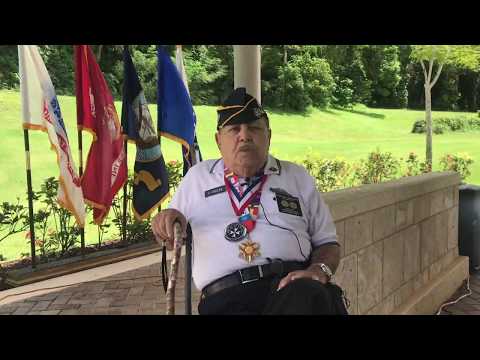
– To the cemetery,
what would you think?
– I want to tell you something.
… what I say. I’m going
to tell you something, you know.
– Okay.
– I joined the Army in 1940.
I was 17 years old.
I trained in Tortuguero, Puerto Rico.
Then went to Fort Neal, West Virginia.
From Virginia, we went to North Africa.
And so we headed. We landed there
with 40 dead because we had a kennel.
Because we had a coronel who don’t believe
that puertoricans were their friends.
He went there and kill it… Somebody killed it.
I said everyone in North Africa, they all went to,
uhm… Germany.
Yeah, and I always tell
… about 10.000 prisoners.
… The coronel called, he used to be a commander.
So I came back to Puerto Rico and stayed here.
Then, they planned the work, the maneuver…
Porter maneuver to certificate
that it was the best way to…
That’s what they said, to Korea…
They fought everything. so, myself was
the driver of Mayor General Harris,
so we left him in here, in Puerto Rico.
1950… December, 1950. So we went
in the Marine links, about 16.000 soldiers.
so we land in Busan. So, at the next day, we …
fight in the front, so I used to be the driver
and bodyguard from Coronel Harris.
So, I had a… with Coronel Harris.
So, one day, General McArthur stopped us himself
and he told to General Harris,
“you have to go to that hill
and throw the people in there.”
I remember that.
And General Harris said,
“no, my people has to come back to me, now.
They’re going to rest.”
So, I thought, uhm… He was, you know,
disobeying an order from a Mayor, a General,
he was a Coronel. So, well he left him over there,
So, I know we have a hook for,… in spanish and english.
So, we have everything that the guys have said.
That’s to believe. Because I spente 11 moths in there
with the Coronel and a mission… heave, we go.
I never really thought…
The day the guy walked in the kitchen,
the Admiral used to chew for…
And in the showers, the showers came down from the hill.
We didn’t know it came from the hill.
He said “my girl is washing there, so…”
So, I went down… three pieces of…, you know,
because I knew everything was alright.
The ’65 is one of the best in the world
I know, because I used to be the driver
for Mayor Coronel Harris. We sailed in maneuver.
We were five rocks from…
Then we left for…
And one of the guys said “load the arms”
and one guy from my hometown, they got a .45.
And when you load the .45, it fires a shot…
General Cordero, he was a volunteer for…
And that’s the way, if you are very sick…
I really think so, because the puertorican who
sailed there,… sleeping back, about 20 degrees.
Also, in North Africa, … we slept in there,
the valley… at 32 degrees.
We had to go to the river,
That’s the way…
I used to go with General Harris,
I uses to be the driver.
– But what do you remember?
– I remember the day.
– What did you feel?
– One day, he went to… We were below that,
everything, we didn’t know that they were hiding.
And one morning we called, so they came down
when we started the kitchen, you know, boiling eggs, the breakfast.
And they called out:
“Everybody! I have a job for our company,
every one of you have to kill seven guys.”
– Oh.
– Wow.
– That’s all I have to say. My brother,
he was a policeman, he.
So, we had so many points and they gave me
the break and sent me first.
Yeah, because, I mean…
The korean, yeah. We fought along that people,
you know, together. And they did.
They had this little sack and that’s where.
– Did you volunteer to fight for Korea?
– No, because I used to be a driver
for the Army, Fort Maneuver.
– Yeah, but did you volunteer to be the driver?
– Yeah.
– Volunteer?
– Yeah.
– Why? Why.
– Because I said “fine”, a day that I went to…
No, I forgot the General, to drive to Korea.
they said four days, and they selected me
to be the driver.
They were looking for a man to follow him,
the General.
Well, I’m telling you,
the worst would be the war.
Because I had to be the devil or the saint.
For example, I’m in Puerto Rico, what happens now?
They say I can’t walk, you know why?
Because that guy up there, he sees everything.
I’m alive because my mother,
she promised for me three times.
Three times. I’m alive because of her.
Look, …
but that one is the one that kept me alive.
Don’t worry. I’m 93 years old. Suffer? Suffer.
– The south korean people. Message.
– Korean people.
The korean people were, for me, the best people in the world.
Because I was with them, fought beside them.
We went over there, they were over there.
They give everything that people,
I remember that.
The people that were over there were…
I’d like to go back over there,
because they treat puertoricans like.
A friend of mine, he went.

– …Cardónez. About the battles in Korea, I only remember that I was a lifer man, I was, all the time– Most of the times in different lines. When we arrived in Korea with the 63rd Infantry, that was the 6th battalion of the Infantry regiment. And we arrived in Korea on 1 October 1950. So we started going in patrols, because by that time [inaudible] elements, and probably the worst one when China came into the war. There were too many Chinese for us. And I remember that we were, I mean, the first division in the U.S., it was in the [inaudible] war. Is that right?
– Yes.
– So it was November, 1950 when China entered into the war, and the first thing they were trying to do was to finish with the Marines that were taking care of the reservoirs. So, it was winter, 1950. The water was up here, about our knees, and the Chines almost destroyed the Marine division, and the 63rd Infantry were holding the Chinese to help the Marines get out of the– and go to the port of [inaudible] in Korea. So…
– And you were part of that?
– Yeah. The 65th Infantry regiment was the last unit left in North Korea during the US [inaudible] in 1950, and — when we got into the ships that were about 15 or 20 miles in the sea, our regiment put a lot of dynamite in the port, and as soon as we left, they destroyed the [inaudible] in order for the Chinese to use any– for the moment. We were taking to Pusan– everybody was taking to Pusan. And– it was– we went into the ships, it was on 24 December 1950, Christmas time. And we had– they gave us supper on the ship, so we’ve been more– removing our clothes, and when we’re taking into the ships, we were ordered to take our clothes, and they gave us clean ones, clean clothing. So, after taking us to Pusan, they assigned us positions 12 or 15 miles at the North of Pusan. The January 1, 1951, I was assigned to this [inaudible] the 3rd Infantry division. When I stayed for 6 months– July, the same year, I think, 1951, I went back to my company, the Infantry division which was in the front. So, in September, 1951, we were attacking the hill at the west of Ch’orwon, there are hills at the west of Ch’orwon. Ch’orwon is about 20 miles from the parallel, up. And– with the [inaudible], the Chinese were all around, and they were attacking us with urgent. And it was raining like hell. It was in September. And I was trying to– we received orders to leave the place. I was assigned [inaudible] one of that. I don’t think the North Koreans are [inaudible]
– On 18 September 1951, we were capturing one of the hills. As I told you, it was raining like hell, and the artillery, the Chinese artillery all the time, and we were ordered to go back and leave our place. So, there were 12 comrades there already, and I was assigned to carry one of them out. When I was taking care of my comrade, I was hit in the back by Chinese artillery, and I have to leave him, to leave the dead man I was carrying. So, I was taken back to the line, to the resting line, and I was taken to some doctor, and — by that time, I had spent almost 14 months in Korea. And I never went back to the front line. They continued to [inaudible] to take me out of the front lines. So, I entered the Army for three years to volunteer. I can tell you that when I graduated from High-school in my hometown, I entered to work in a drugstore. And on 20 June 1950, I entered to volunteer in the Army to study for officer at the canals in Panama. Five days later, the North Korea, at that time, South Korea, and we were sent to the canal zone, and it was basic training. And when we finished the training, the company commander asked me that they wanted me to stay at the pharmacy in Panama, and I said, “No, I want to go with the Japanese.” So I went volunteering to Korea. I went volunteering in the Army, and volunteering to Korea.
– Why?
– Because at that time, I was 20 years old, and I liked adventures, I liked risky scenes.
– But you could’ve risked your life.
– That was something included in the package. So, I studied three years in the Army, and– get my [inaudible] studying at the University of Puerto Rico. I worked for the government for 23 years, and at the four years studying makes 27, and three years in the Army makes 30. “It’s time to get out of the government.” So, in 1881, I had been working by myself as a lawyer.
– Yes. One more question because you said that you wanted to risk your life for adventure, and you could die. But here, you’re at the cemetery, with comrades who did die. What do you think when you come here?
– Well, we come here because we’re alive to honor them with our visit here. And we do the best we can to have this place as it is.
– Are you glad that you didn’t die, though? I am, I’m glad.
– I’m glad. I’m glad I’m alive. And I– when I saw Korea last September, it was like a miracle because– Korea was all destroyed, and now they have this beautiful country, beautiful Seoul, the capital. And nice people everywhere and I’d like to do there again. Sometime, I will.
– Soon.
– It was nice to have you here, and I hope you enjoy your stay in Puerto Rico.
– Thank you so much.
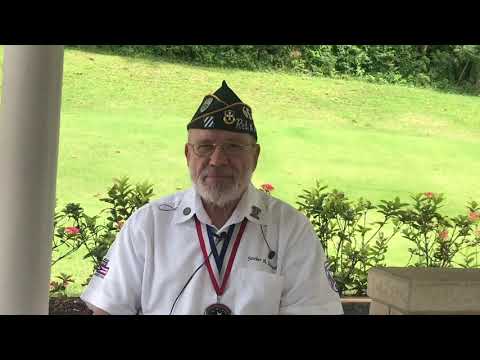
[ININTELIGIBLE]
– My name is Javier Angel Morales. I am the past president of the 65th Infantry Veterans Association. I served for about 5 years. Our organization [inaudible]. And they were the ones who organized this whole association in 1936. At one time we had numbers of about 500 members. Now they only have about 150. They had to open up the association to allow veterans from other conflicts or wars to become members, because we want to continue the legacy that the 65th infantry gave to Puerto Rico. As to the Borinqueneers, there was a voluntary army, first [—] in 1917. They were all voluntary. They didn’t have to be drafted. The draft came in World War II. After World War II then came Korea. During the Korean War there were a lot of draftees. I could relate to some of the stories given to me by the different veterans, who were in smaller towns, but when they heard that there was a truck coming picking up those that would like to join the service, they jumped on the truck and were taken to [—-]. Some of them… one person told me that it was the fourth time he was trying to get in the truck, but they turned him down because his age was not the legal age to be drafted. [inaudible]. The regiment was composed of veterans that were from World War I and II. They had been volunteers and they were ready to retire, but they were asked to stay so they could train the new recruits, so most of them did that. That’s why I think the regiment was so…
– Experienced?
– So experienced during the first years of the war, that they were labeled [—-].
– How many served and how many suffered [—-]?
– The count that I have from Puerto Rico was about 63,000. Out of those 63,000, there were 2,700 that were wounded in action. There were about 740 that were killed in action, and out of those 740, there were 122 that were missing. Currently I think there’s about 110 or 112 that are still missing in action. And as they find their bodies or they’re able to identify them, they are added to the Wall of Remembrance in San Juan.
– So, if there’s… I know the 65th earned the congressional gold medal.
– Yes.
– Of course I’m partial, I know they deserved it, but not everybody knows. So, why?
– Okay. The regiment was very successful. They had a maneuver in Vieques called Portrex. They went against the best unit from the United States [——], and they were able to repel that invasion. So that stayed in the mind of Colonel Harris, and when Colonel Harris was in Korea, they asked him that they needed an infantry unit to be able to go to Korea because they were running short. So he said, “Well, I had a regiment I’d like to bring here.” and he mentioned the 65th infantry regiment. But they were… the high brass was very reluctant, because one of the things they said is, “But they never fought during World War I.” Only one battalion fought, which was the 3rd battalion. There were two casualties. And during World War II, they were mainly to secure… or security, of the different bases, of the different places in the Caribbean and in Europe. During the Korean War they were an infantry regiment, and they were well prepared because, like I mentioned before, a lot of them were veterans from World War II. They had experience, they had training necessary to be in battle. And so, that training went on to the new recruits that came in. When they got to Korea, they were instrumental in helping the 1st [—] division exit from the surrounding by the Chinese. Although the Chinese were pushing us back into the sea, the 65th regiment was the last unit to disembark, or to get on the boats, because they were the last ones that were safeguarding the back of all the other soldiers.
– Two last very simple questions. One is, you’re not even a Korean War veteran, why do you care about them so much? Okay? So that’s one. Two, tell the Korean people why they shouldn’t forget.
– When I was in the service, I was serving in Germany, and one of my fellow compatriots mentioned the 65th infantry. I never knew anything about the 65th. I wasn’t interested because I just wanted to serve my two years and leave. When I retired at 60, there was another instance, where I was in Connecticut and I overheard somebody say, “The 65th? They didn’t do anything right.” And that kind of stayed on my mind. I said, “I have to find out about that.” So, when I retired at 60, I said, “I need to go to Puerto Rico, because I want to see Puerto Rico.” [——–], and I did that. But before that, I told my wife and she started crying, and I said, “What’s the problem?” She says, “Well, you’re going to get old on me, and you’re going to die.” And I said… that scared me, and I said, “No, no, no. I have to do something.” So I came to Puerto Rico. Six months I went around the island. This time my brother was calling me. He says, “Look, I need you to help me.” And I said, “Help you what?” He said, “I need you to help me find veterans that were wounded, because I want to start an organization in Puerto Rico called The Purple Heart Organization, to be able to recruit and have a chapter, a register in the national Purple Heart Hall of Honor.” And I said, “Well, I’ll see what I can do.” Meantime, the president of the 65th infantry association was after me telling me the same thing, “Look, I need your help. You’re the youngest, and I need to make sure people don’t forget this organization.”
– So, to the Korean people, why should they not forget the Borinqueneers?
– To the Korean people, first of all I want to thank them very much, because I had the opportunity to go to Korea, and the 65th infantry was very instrumental in safeguarding the country. They were very instrumental in making sure that democracy was installed in Korea. They were very happy to be able to defend your country. A lot of them gave their rights [?], they shed the blood, and they shed the tears. But they did it for a purpose. They wanted you to be happy, your generations in the future to be happy, to be able to live in democracy. And so, the sacrifice that was made by the 65th infantry regiment was not done in vain, your country has progressed quite a bit, your people are very nice, and we really appreciate the way you think about us, the Puerto Ricans and the 65th infantry regiment.
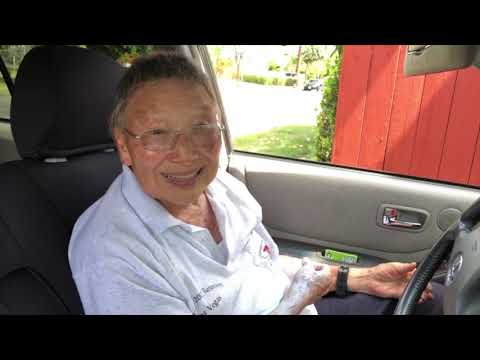
>> Hello, my name is Tommy Tahara, and then I was stationed at Camp [INAUDIBLE] in [INAUDIBLE], Japan, before the Korean War. That was in 1950 when … And then when the Korean War started, I was in the 7th Division, Company E … No, Company F. “Fox Company,” they call it, Fox Company, and then I was stationed in Camp [INAUDIBLE], and then … What do you call it? When the war started, took none of our personnel from our company and put them in the 44 and 25th Division, so we were left. We were [INAUDIBLE] starting [INAUDIBLE] our company. So, actually, we went in August. We went to Camp Fuji, and we were waiting for the KATUSAs to come in. They picked up all the young kids or whoever old men from Korea, and they loaded up them on a ship, and they shipped them to Yokohama, and then they trained them to Camp Fuji. That was in August of 1950, and one of a friend … He’s the old chapter. He’s a KATUSA. His name is Seok, and then he was with the 7th Division. Our 7th Division, we had about 9,000 KATUSAs, and every company had about 100 KATUSAs. In other words, that made us, you know, combat-ready, but we had to train those guys because they came from Korea, and when they hit our cafeteria, our kitchen, they’d get a cup of coffee. They’d put about 10 teaspoonful of sugar in there because, you know, sugar was … They couldn’t get it in Korea, but anyway, they were terrible. They had diarrhea and all that after that, but after we trained them only for about 3 weeks, and then we loaded up on a ship, and we sailed to Korea. We waited in Pusan Harbor, and we waited outside of Pusan Harbor and waited for Operation Chromite. That was invasion of Korea with the 1st Marine Division and the 7th Division, Infantry Regiment. Anyway, I was in the 17th Infantry Regiment, and my friend Seok was in the 31st Infantry Regiment, and okay. We landed in Inchon, and then we headed towards Seoul, but at that time when we left, we were still young. I was only a [INAUDIBLE] 19 years old, and then we saw all the dead bodies all over the train station, civilians and all that. First time we saw those dead bodies, and most of us … Korean civilians over there. They’re … I guess they got killed by the bombing and all the artillery and the ships because we had over 100 ships outside of Inchon. Anyway, after that we went to where the first battle. It was a hill over Seoul, and then that’s the first time I saw bullets flying all over my head, and my buddy right next to me, he got shot right in the throat. He was standing right next to me, and he got shot in the throat, and you know how frightened you get because that’s the first time you see a guy bleeding from the throat now. Anyway after that, we headed towards Suwon and Suwon side, down south. It was the North Koreans were retreating back. It was we were coming back from the Naktong River side. They were coming back up, and we were going down and meeting them, so we had some few battles over there, around [INAUDIBLE] Suwon earlier, and later on, you know, until almost October, they trained … We’re a convoy bound to Pusan, and from Pusan, we loaded up on our LST and then we headed up north on our [INAUDIBLE]. What sea was that? Japan’s sea all the way up north, and then we passed Wonsan and we landed in Iwon. That was in November of 1950, so you see, the 7th Division had three regiments: 17th Infantry Regiment, the 31st Infantry Regiment and the 32nd Infantry Regiment, and I was with 17th. Okay, that’s … I think the 31st one on our left, they closed the Marine side, the 1st Marine Division. They came up from Wonsan, riding down … What it called? San … What it called? Sanjin, or they’re … Anyway, they call that [INAUDIBLE]. I think they call it Hyesanjin. Hyesanjin, that area. Anyway, the Marines were on the left side of the Reservoir. Then couple of battalions of the 31st and 32nd went on the right side of the river, and our friend Seok was in the 31st. He was on the left side, and our 17th, we went up our way through Kaesong. We’re 80 miles above the [INAUDIBLE] to Chosin Reservoir. We ride up to Kaesong and then to Hyesanjin. It was right on the Yalu River over there, and we still [INAUDIBLE] was in the [INAUDIBLE] yeah. Anyway, was in the [INAUDIBLE]. October/November, anyway. That’s the first time I saw snow. The first time I saw snow, I’m from Hawaii, and it was real warm. [INAUDIBLE] just like cotton falling down, you know? So excited. Anyway, we went inside our [INAUDIBLE] first, before [INAUDIBLE] on Yalu River, and then [INAUDIBLE], we found a reindeer [INAUDIBLE] over there, so the guys shot one reindeer, and that was before Thanksgiving now, so they hang up the reindeer, and they cut it all up here, and I think I ate some. I’m not sure [INAUDIBLE]. Anyway, after that, we stayed there in, what do you call, Hyesanjin for a couple of weeks of [INAUDIBLE] in the new [INAUDIBLE], once you’re in [INAUDIBLE]. It was so cold, so anyway, right about that time, the Chinese came down, right through there, or [INAUDIBLE], what [INAUDIBLE] got paid back or something like that, and then the Chinese kept pouring in, so we had to retreat, so what we did was threw the [INAUDIBLE] lot of our equipment. We dropped. We [INAUDIBLE]. Another we had [INAUDIBLE] we couldn’t carry. We could run it, and then we kind of retreated back there. I think, gee, that must have been about over 100 miles to Hamhung, H, A, M, H, U, N, G, Hamhung, and then I think in a couple of weeks, we entered Hamhung, and we set up out base outside of … The 1st Marine was trapped inside here by the Chosin Reservoir, with about two, three regiments of the 7th Division, 31st and 32nd. I think that was called task force [INAUDIBLE]. Anyway, so we were down by Hamhung, and we set up our position over there in the … What do you call it? When the Marines got to the trap over there, they escaped. They came down from Hungnam. Hungnam, it was, Hungnam, and they moved to Hamhung, Hamhung. That’s where they had the big park over there, and we had, oh, so many ships out there, Japanese ships, all kind of ships because we had to escape. We had to get away. Whatever equipment we could carry, and then we load it up on the ship. Was in almost December, almost Christmastime, and the whole division loaded up on a ship, LST or whatever, and then we headed to Pusan. Again, the last outfit that left there was the 3rd Division. They were the last ones there, to blow up all the places that Hungnam, Hungnam, the park over there. And then December, Christmas, almost New Year’s, we were in Pusan, and then we had frostbite. Most of us had frostbite because the cold. Sometimes it was about 30 to 40 below 0, and the wind was terrible. You cannot go outside and just use the toilet over there because it’s so cold, you can’t … You know what I mean. Thirty, 40 below 0, so all our hands all black. You see my hands? Oh, yeah, all black. Anyway, so anyway, we went to Seoul or Pusan. We went to medical. They checked us out, and I guess at that time to last [INAUDIBLE] leave like a South Korean troop, so they got something out. At that time in the ’50s, a [INAUDIBLE] Caucasian, Asian. They’d call us gooks, again, even though I’m an American, but since I’m Asiatic and I look like a South Koreans or whatever, and they looked down on us, some of them, and some of them are nice, but anyway, after that, in January of ’51, we went up north again. [INAUDIBLE] set up position. Maybe [INAUDIBLE]. I know I remember when Chief [INAUDIBLE] someplace in the [INAUDIBLE]. They said Chief [INAUDIBLE] had a gold mine, so everyone [INAUDIBLE] gold mine [INAUDIBLE], and then [INAUDIBLE] went up to [INAUDIBLE], [INAUDIBLE], and then they all went to this, so the reservoir over there, I think it was [INAUDIBLE] or something like that, and then there was a lot of fighting over there, and actually scariest fighting we had was in February of 1951. At night, as a first stand we had a attack from, what do you call, like a bonsai attack where all of [INAUDIBLE] shoot the flares up in the air and the trumpet and the bugle and all that, and they come charging up there. That was the scariest one because you was young and only 19 years old. Anyway, that was the first experience. I said that [INAUDIBLE] because in the dock, you just keep firing. You don’t know who you’re shooting at because [INAUDIBLE], and a lot of troops died here. In fact, the scariest thing is when you shoot in a foxhole, and you wake up in the morning, and your companion is missing because the Chinese coming. You’re in a sleeping bag, sleeping. They grab the sleeping bag and drag you. They drag you, so when you look at, your buddy is gone. It’s very scary, so actually when I came back home, I used to get nightmares. When you’re in bed, you get what they call PTSD. [INAUDIBLE] screaming in bed, and you are yelling. Yeah, I was like that all those years. Anyway, after June or from 1951, they gave me a, what do you call, rotated. They rotated me out because I had enough points, so instead of coming back to Hawaii, I met my friend in Sasebo. Sasebo, and you know what he did? My friend, he went to personnel, and he changed my order, saying that he’s … I’m going to what do you call? I’m going to the East Coast with him, and he gave my name and his address, so they shipped me over to … on a ship, and we went to San Francisco, and the three of us, with friends, took a train all the way to Chicago and, from Chicago, caught another train to Baltimore. Went to Baltimore. In Baltimore, my friend, he had a wealthy family. They had a hotel, like a inn, a restaurant and a barber shop, so my friend’s dad, he bought him a new convertible, Ford convertible, and that was in ’51. Let me see what’s that, July … No, it was in August, September. Two months I was staying with him in Baltimore, called Baltimore. Anyway, we had a lot of fun. Then we separated. He went to Fort Benning, Georgia, and they sent me up to Fort Dix, New Jersey, so I was with the 39th, the 9th Infantry Division, 39th Infantry Regiment. There was a basic-training company, and then, see, I couldn’t stand the New Jersey weather. It was terrible. It was so cold. [INAUDIBLE] Atlantic Ocean, but it was … because I had all frozen hands, fingers. I didn’t like the cold, so I said, “I need a transfer.” So they tell me, “Where you want to go?” They gave me three options: 3S, it was on the great [INAUDIBLE] 3S [INAUDIBLE] same thing or Germany or Japan. When they said Japan, I said, “Oh, okay! Okay, I’ll go back to Japan,” so they sent me back to Japan, but you know where they sent me? They sent me with the first captain, the first captain that [INAUDIBLE] Korea from [INAUDIBLE] to [INAUDIBLE] Okaido. I went with a … They sent me with a 7th, I mean a 1st Cav, 7th Cavalry Regiment in support, outside [INAUDIBLE] Cav [INAUDIBLE] profit, so we had ski training over there, and anyway, I was there for all about, what, 2 months. Then I went AWOL. You know AWOL? And when I came back after about a week, they threw me in the brig, all of us in the brig. Well, they sent us back to Korea! Instead of giving us [INAUDIBLE], they sent us all back to Korea, so I ended up with a 3rd Division, so 3rd Division when I went there was in 2nd Battalion. They send me to 2nd Battalion, 7th Infantry Regiment, 3rd Division. This guy … They sent me to his headquarters company. It’s like a, what do you call, this Japanese guy, Futo. He was heading a squad of Koreans who could speak Chinese and all kind of Shanghai and Mandarin and all that, and then they could speak Japanese and, of course, Korean, so anyway, a squad of Crown, we call that the King Fishes, so I was put in charge of that. I was a squad leader for that, and it was all Koreans, and they don’t know Japanese. I could speak a little Japanese, so that’s why they put me in there. Anyway, what we did was … Everybody, we had some radio and we’d listen to the, what do you call, the Chinese and the North Koreans, whatever they say on their radio where they communicate, and we intercept them, and we tried to decode what they’re saying. They’re all talking [INAUDIBLE] we call it [INAUDIBLE]. The Chinese are talking code, so they’d translate to me in Japanese, and I’d try to translate it in English to the battalion headquarters. Most of the time, we were up on the hill because when we sent out a patrol at night, that’s when you … We had to listen to see if the enemy is … They came on the patrol that’s coming in, so anyway, sometimes when we’re up on the lookout, way up there and then we’re looking down, and then the Chinese threw artilleries, hundreds of artillery on us. In fact, one time the artillery was so close, it hit our bunker and then blasted us. It was almost a bit, only about 4 feet or 5 feet in front of me. I said the whole bunker, and I had three, four Koreans with me that were translators. All of us in that bunk [INAUDIBLE], and before I knew it, I was on a helicopter. They sent us back because my eardrum was blasted. Couldn’t hear, had concussion, and so they sent me back to the back. I don’t know how far back we went but helicopter. It was the first time I rode in a helicopter, and I was so scared. You know, helicopter is so nice, so small. Those days, the helicopters were small. Anyway, I was there for almost 1 month, and they sent me back to the company, and you know what? To this day, I cannot remember anybody, the first sergeant, the captain in that time. When I came back, I don’t know how I came back, and it took me months and years to find out how I came back, and I had PTSD. Anyway, when I came back in 1953, I’m telling you, oh, I didn’t know what to do because I couldn’t remember a lot of stuff. It was because of that concussion and all that. My doctor said maybe I had something, amnesia. You forget, yeah? And those days you didn’t have this kind of VA and all that. I had to go to a private doctor, and the private doctor … My hands were all blue and cold. They thought I had Raynaud’s disease, so I had to quit smoking, and I had to quit drinking coffee because it affected my hands, so to this day, I don’t drink coffee or smoke. I used to smoke two packs a day, but … Ah, that’s okay. Anyway, after that, when I came home in ’53, I found a job in the Marshall Islands with AEC, Atomic Energy Commission. We were testing those atomic bombs or hydrogen bomb, so we were a service company [INAUDIBLE] and in our, let me see, [INAUDIBLE] November. November, I went back to the Marshall Islands to stay there in Enewetok Atoll. Enewetok Atoll has about 22 small islands, and we were on Parry Island, and then what we did was our company was service [INAUDIBLE] of scientists, the army personnel there. You know, we’d clean. We’d clean their house, laundry, everything. It’s the kind of job we had. Anyway, I stayed there for about a year and a half. Then I came home for a couple months. Then I went back, and I did that for about 6 years until … from end of 1953 to about 1959. Almost 6 years I did that. And after that, when I came back, I worked for the US Post Office, and then at the post office, I was assigned as to deliver mail. At that time, we were delivering mail with a motorcycle, motorcycle with a sidecar. We’d put all the mail in a sidecar and then deliver the mail, so actually after that we had trucks, all different kind of trucks, and during that 44 years I worked as a carrier, I got bit six times by dogs because at first when you ride in a motorcycle, we didn’t have any leash law in Hawaii. Leash law is you’ve got to leash the dogs, but the dogs were always running loose all over the place, and they’d chase the motorcycle and jump on you, and they’d bite you. I got bit six times. Anyway, after that, we had the leash law, so they had to tie down the dog or put them in a fenced house, so they cannot be running around loose, so I was 44 years as a carrier, and then I retired in 2004. Ah, that’s about it.
>> And right now you play such an instrumental role …
>> And then in 1988, I joined our chapter, Chapter One, and then later on, 1988 and about 2006 or 2007, I started helping out with the POW/MIA guys. They used to come every year to what you call a reunion. Every year we had a guy in our [INAUDIBLE] POW [INAUDIBLE] Matsumoto, and he used to handle that, and I used to help him with our [INAUDIBLE]. Anyway, that’s how I learned how to do things, how to make a reunion in order. After I knew how to do that, I had to contact with all the personnel down in Hickam, down in Camp Schmidt, Hickam, and then me …
>> What …
>> Me and another guy, we did all our chapter’s event, even punch bowl event or [INAUDIBLE], whatever event we had in [INAUDIBLE] Christmas or whatever.
>> What does it mean to you, the legacy of Korean War veterans?
>> What’s that?
>> The legacy of Korean War veterans, what is it to you?
>> At first, we didn’t know where Korea was actually. I’m telling you, but we heard of Korea, but when we went there, the first thing we saw was, the Koreans at that time, they always walking with that hat. What do you call it, the long hat, the black hat?
>> The gat.
>> Yeah, with the [INAUDIBLE].
>> Yes, gat, gat.
>> And they got white, white shirt. Everybody wore white those days and then the smell of the, what do you call that thing, honey bucket? They used that as fertilizer, yeah? They put on the whatever, the waste from each house. They put it in a bucket, and they get the ox to move it, and we would see that, and what they did was they threw that thing, that dew, into the rice field as a fertilizer, but that’s the first time we seen it. Anyway, Korea, when we left over there, it was a wreck, nothing. Everything was flat, and I was surprised when I came back for the revisit. I think it was in 2001, the first summer I came back. Wow, everything was built in [INAUDIBLE], those big towers, all that. I was really surprised. I tell you, though, Koreans, they really worked hard, and they did a good job. And I guess they always respect [INAUDIBLE] soldiers or whatever for helping them out because if it wasn’t for American soldiers, our soldiers from the different countries that helped Korea, Korea would be just nothing, just like the North now. Look at the North. At night, you cannot even see the lights, so anyway, I’m really thankful that Korea is what it is today. Okay.
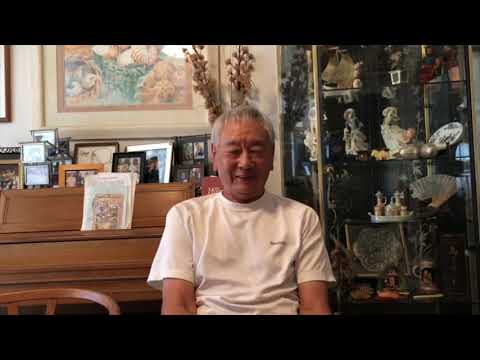
>> My name is Jose Jimenez. No. Frank R. Chang, and I was in the First Marine Division, and at that time, back in the 1950s, right after World War II, I joined the Marine Corps, and it was rare at that time because there were no Chinese in the Marines, very few. They were just starting to let them in, and I was one of probably the first half dozen to a dozen, at best, in the Marine Corps. Okay? What else do you want to know?
>> Did you get to … Why not the Army? Why the Marine Corps?
>> Oh, there was a lot of good movies put out on the Marines in those days, so that’s what got me in there, and it was very romantic and brave and heroic, and they were going to save the world, and I was a young guy, and didn’t know any better, and so I joined the Marine Corps when the war, Korean War, broke out. That was December of 1950, I don’t know, 1951, ’52.
>> Knowing that the war was ongoing, and knowing that you could die …
>> Oh, when you’re young, you don’t worry about dying. You think you’re going to live forever.
>> What do you remember?
>> What do I remember?
>> Where did you get trained before …
>> What do I remember?
>> Where were you trained? Which camp?
>> I trained in Camp Pendleton, California. Down there towards San Diego, between San Diego and Los Angeles. I was probably one of the first half dozen orientals that joined the Marine Corps at that time because it was right after World War II, and prior to that, and during World War II, they did not have … bring in the Chinese or orientals in the Marines, and especially during the Korean War you would be mistaken for an enemy because at that time, they were stripping our wounded and dead and wearing our uniforms because they were poorly equipped. The Chinese that came into the war in Korea were not equipped very well. They were recruited fresh from China, and they were only in Chinese uniforms, and it was winter when I went over there, so they were stripping our dead and wounded of their clothing and wearing it, so it was quite something that I was able to go over there because, being oriental, that’s the first thing you aimed and pulled the trigger on because we were fighting North Koreans and Chinese at that time.
>> Did you face discrimination among other …
>> Well, they always thought I was the enemy, and having joined the Marines, I was probably, like I said, probably one of the first half dozen, not even a dozen that joined the Marines and were able to be part of the Marine Corps, and many times I was pushed out of the foods lines, what we called the chow lines, because I looked like a Korean or a Chinese, not Chinese but mostly Korean because we had a lot of Koreans working for us.
>> Oh.
>> So if I’d get in the chow line, they’d kick me out.
>> Because they thought you were one of the houseboys or interpretors.
>> Yeah, they thought I was one of the houseboys or one of the what we call … I hate to say it, but that’s … We used to call them chiggy bearers, and these were the Koreans that we recruited to work for us.
>> What bearers?
>> We used to call them chiggy.
>> Chiggy?
>> Yeah, C-H-I-G-G-Y, chiggy.
>> What does that mean?
>> I don’t even know what it means, it’s just a name, but these were Koreans that we hired and they carried all our ammunition, all our food on their backs up these mountains, and this was when I was young and wild, and I called them the chiggy bearer, but I soon learned that these were not just chiggy bearers and slaves. They were people, and one of … A little old Korean man taught me a lesson that I will never forget.
>> Share that.
>> Well, we just got through battle, a battle, and we took a hill. We took the position, and as we were digging in, as we call it in the Marine Corps, we were digging out foxholes and building fortification, this little Korean chiggy bearer, as we used to call them, this little Korean guy, after carrying a big, heavy box of food or ammunition up those mountains to us, after they drop off all the supplies, before they go back down the mountain, they’d spread out through the area, and that day, after the battle, I was cutting a huge log for something, and being a young person and a Marine, I looked down on this little old guy, but he pushed me aside, and he grabbed the ax that I was using, and I’ve been working on this log for maybe an hour or 2 hours or 3 hours but forever, and I hadn’t gotten very far, but he grabbed the ax from me, and he proceeded to chop it up in about a minute and a half. He was like an automatic machine, and as I leaned against a tree or wherever I was leaning against, I thought to myself, “I’m ashamed of myself. I’m very ashamed of myself because I looked down on this little Korean man. He carried my ammunition and my food up this mountain, and I’ve been working on this log for 10 years and didn’t get very far, and he comes up here and he shows me in a way how to chop a log up,” and he had it chopped and piled up in less than a minute and a half. He was like a machine, and that’s when I learned, as a young person, never look down on anybody else, no matter what, and even though I came over to this country to help him, he showed me something, and I was ashamed of myself, and that was a lesson in life. I never forgot that.
>> Humility, huh?
>> Never look down on another human being, no matter what.
>> Let’s talk …
>> That’s my story.
>> Yeah. Let’s talk about Punchbowl because Punchbowl is a very famous battle.
>> Well, by the time I got to Punchbowl, the hills had been taken.
>> When was that? What month and year?
>> I don’t remember the month. I’ll tell you the year: The year was about … I think I was … I don’t even remember. I think I was over there in ’51, ’50 or ’51. We were there. I was there, and I spent a Christmas there. Christmas Eve, I was walking by myself, and the guns … And we had big guns in the Punchbowl area, and they would fire off every so often, and it was one of the most … How could I say it? Incredible sounds that I hear to this day, the big guns firing. Christmas Eve in Korea, a cloudless moon. It was a beautiful sight, really, in your memory, and the guns would fire off every 5 to 10 minutes, and the echo reverberated through the Punchbowl area because it had, what, three sides of the mountains all around you, and I hear those sounds today, periodically, so that’s kind of a memory of Korea.
>> Many died in that battle.
>> Many, many, many.
Many, many, many, and they … not ours but on the other side, the enemy, they laid where they died.
>> North Koreans or Chinese?
>> Pardon?
>> North Koreans or Chinese?
>> Probably a mixture because you couldn’t tell. They all looked alike. I looked alike. I looked like them, and in fact, I’m probably … Like I say, I’m probably one of the first half dozen, other than my comrades here in the group because they were … I guess I’d say they were probably in the northern part or the western part of the … I don’t know. I was young at that time, but in the Marine Corps, in our sector, I was probably one of the first half dozen that was in combat. Yeah. Because in the Marines, they didn’t have Chinese, and they didn’t have orientals, and in fact, when I went over as a replacement, there was one other guy that came in from Tarrytown, New York. His name is Al Hui. That’s that guy right there. That’s Al Hui, and …
>> His last name was Huey?
>> H-U-I, Hui.
>> Oh, and where … Which state was he from?
>> Huh?
>> Which state was he from?
>> No, no, I’m sorry.
>> What’s his hometown?
>> There were two. That’s Al Hui there. He was from Tarrytown, New York, and this is Herbie. That’s the other oriental guy that I met over there.
>> Where was he from?
>> He was from Wisconsin some place, which is from unusual, and I was from the San Francisco, Bay Area, so there were three of us. We got all separated in different parts of the First Marine Division, but Al and I landed together, ended up together at the replacement depot where the new guys came in, and they called Al and myself into the commanding officer’s tent, and commanding officer is siting at a table there, and we were standing at attention in front of him, and he said, “You two guys” … I remember, he pointed at … “You two guys are not going to go up on line and join an outfit.” He said, “You won’t last more than a week,” because we were fighting the Koreans and the Chinese at that time, and it was wintertime, and they were stripping our dead of their clothes and wearing them, so the first time orientals in the Marine Corps, there was no such thing. There were, like I say at that time, there were maybe six, half a dozen at best of …
>> In the entire Marine Corps or just your division?
>> Hmm?
>> In the entire …
>> In the entire Marine Corps, in the entire Marine Corps because the Marines were fighting in the islands during World War II, so they were fighting the Japanese, and they had no Marines, as far as I know, and I’m pretty darn sure because when we went over there, Al and I stayed together, and the commanding officer said, the replacement depot officer said, “You two guys are not going to go off the line. We’re keeping you back here. You won’t last more than a week,” and I looked at Al, and he looked up at me, and I said, “No, sir, we want to go up on line and join our company,” and I remember his exact words: He said, “You sure?” and I said, “Yes, sir. I want to join my company.” He said, “Okay. You won’t last more than a week, but if that’s what you want, you will join them,” and I joined Dog Company, and Al joined the Easy Company, which when we went up on the battle together, battle lines, we were always together, the two companies, alongside of each other.
>> Did he make it back too?
>> Hmm?
>> Did he make it back?
>> Al made it back because he was a machine gunner, and machine gunners are pretty good. And, well, we were both lucky.
>> And you saw combat?
>> Oh, yeah.
>> So you saw people actually die next to you?
>> I wasn’t with the company more than 2 weeks. I walk down the hill one morning. There was roughly 27 guys. Next morning, four of us was carrying a stretcher, and one of my guys that I went over there with, we carried him on that long, up a mountain, and by the time we got within about 25 feet of our line, he rolled off one last time and died. I carried him all night. We carried him all night up a mountain. So that was my beginning in Korea. Yes, we saw a lot of people die. We saw a lot of people never made it home. This is why, today … That’s why today, I still don’t forget. You never forget.
>> And you were how old?
>> I guess I was … No, I was 17. I joined when I was 17, April 5th. I was in Korea, I think November, November of that same year, after training …
>> In 1950? In 1950 or 1951?
>> 1950 … I don’t know. It was 1950 or ’51. I forget the year now. I haven’t looked at the records or anything.
>> Because the war broke out on June 25th, 1950, so maybe ’51?
>> Well, it might have been ’51. I forget now. My mother had to sign on a dotted line for me to get in because I was 17. Yeah.
>> How old are you now? Or how young are you now?
>> Eighty-four.
>> Well, you’re still considered young compared to some of the veterans, right? And you keep yourself very, very fit and healthy and young, and I guess …
>> Well, God has been good to me. He gave me good genes, and I guess I took care of my body.
>> Because you probably understood how precious it is.
>> I stayed fit. All my life I was pretty fit because I’ve been in the outdoors. I was at … No, actually, I have to take that back. See, I have to think because I never even thought … I was 18. I was 18 when I went over to Korea. I was 17 when I joined the Marine Corps, and in the Marines … I went in at 17, and I had my 18th birthday a month later. I had to get in so bad. That’s another story from way back.
>> When’s your birthday?
>> But I had to have my mother sign on a dotted line.
>> When’s your birthday?
>> Hmm? April 5th.
>> Your birthday is April 5th?
>> Yeah.
>> I went in March 7th, March 7th.
>> My birthday is in April too.
>> You’re another Aries, that’s why.
>> Oh, I’m a Taurus.
>> Oh, you’re a Taurus.
>> Yes.
>> Oh, well.
>> Even more stubborn, Tauruses.
>> Yeah.
>> Well, first of all, you …
>> Yeah, well …
>> Many followed … You’re a pioneer, in a way, because many … Now we know there’s many Asian-American …
>> Oh, nothing but orientals in there now, many, many.
>> My cousin was …
>> In fact, I have a grandson …
>> Yeah, my cousin was in the Marines for more than 20 years.
>> Yeah, my grandson was in there. Where is my grandson? There’s my grandson. He came back from Iraq.
>> That was another difficult war.
>> This shows him come back from Iraq, and I was carrying his pack.
>> Mm. You must have been so proud.
>> I was carrying his pack.
>> Now, you have some pictures here. Did you take any of them yourself, the pictures?
>> Oh, I probably did. These were in Korea. These were the only ones that survived in Korea. I had what we call a Pony 135-millimeter camera in those days, but the thing is I had several rolls of film, but the moisture, and we could not develop over there, so by the time I got them back, they were all moldy, so I never bothered to develop a lot of these pictures, and they were all …
>> But they’re still very well-kept.
>> Well, not all of them. They were mostly all ruined. I didn’t take a lot of these pictures. A lot of these pictures I … Some of these, I took. This was over there. This was over in Korea. These are the hills in Korea, and I think these were too, yeah, but very few of them survived. That’s when I graduated from what we called boot camp. This is a picture over here in Camp Pendleton that I was at, 18 years old, but the only pictures that really survived … This is a battle picture that survived.
>> Where was that?
>> I don’t know. One of the many hills. Right here, this is one of the many hills that we took, and here’s that Al, up in the battle line. He was in Easy Company, and I was in Dog Company, and we was always together.
>> Did you both keep in touch afterwards?
>> Pardon?
>> Did you keep in touch after the war?
>> Yes. We both made it through and came back, and we kept in touch, and he was a smoker, so he did himself in.
>> What do you think … Looking back, while at the time you were young and you wanted to seek adventure, so you joined, but looking back now, almost 70 years later, what do you think … What do you think your legacy was?
>> What do I think of what?
>> What do you think your legacy …
>> I have no legacy. My legacy is, I behaved myself, became a good Marine, did my part for something. I don’t know what, but the most important part is, God taught me many lessons.
>> And you’ve been back to Korea?
>> Oh, yeah. Yeah, yeah, yeah. Most wonderful part because the Koreans over there had a program for these last … How many years now? God, 30 years, 40 years, and I’ve gone back and able to visit and see the growth and what was accomplished, and it kept me humble.
>> I hope you feel very proud.
>> Well, I just did my part, just like many, many guys, and especially the guys that never made it home. That’s what I’ll … And that’s what … That’s what I keep remembering. I made it home, and most of these guys that we had reunions later on that I was able to get ahold of, we owe for all those that never came back …
>> Well …
>> … that never came back. We were all young men at that time, and these reunion pictures that were taken, we grow old from young men. We grew old, and there I am old.
>> And I would like to say you lived to tell the stories, and honor the memories …
>> Well, it’s important …
>> And honor the memories of those who couldn’t come back.
>> Yeah.
>> So thank you, and I guess that’s what I’m just trying to do to honor your memories.
>> Well, not so much as mine but those that never made it home.
>> Yeah, but …
>> That’s the important …
>> You’re the one that’s tell theirs …
>> Well, I can …
>> … because who will remember them?
>> I can do my best to tell the story as best as I can, but it’s not just me. It was many, many of them, especially those that I went over with. They never saw a month. They never saw one month more.
>> I guess when you’re young … Well, not even when you’re young, but many people think it won’t happen to them, like you read in the paper about somebody crashing and dying in a car accident, but you never think it’s going to happen to you, but so many of fearlessly just joined, thinking it won’t happen to you, but it must have been very, very real when it did … you saw …
>> When you’re young, your mind is small, and you don’t experience a lot of things. You go over there as a young man. As a young man, I walked down the hill. I wasn’t over there a month. I walked down the hill one morning with, I would say … I have the number in my head 27. Twenty-seven of us walked down the hill one morning, and the next morning, to my knowledge, there was only four of us that walked back up. I carried a stretcher within one of my buddies at 18 years old up a hill all night long after a battle during the day. We walked down a hill 27 of us. Next morning, four of us walked back up carrying a stretcher.
>> So what do you think was … How are you the four that survived? What do you think was your, I don’t know, blessing, luck, fortune, skill, whatever it was?
>> God. There’s such a thing as a God.
>> Well, why do you think …
>> See, I was raised in an orphanage that was a Christian orphanage.
>> Okay, that’s what I thought.
>> So I believed in a God quite early as a young man.
>> Okay, so it was God, but why did God spare your life if, maybe out of the 27, all of them believed in him?
>> That’s what I asked. Through my many, many years to my old age, I talked to God constantly. I don’t quite follow him well enough, but he’s there. I know there is a God. I believe in a God.
>> Oh, I do too, but sometimes I ask, “Why me?”
>> That’s the question that we all had. That’s the question that all of us asked, not in public, but I can tell you this between you and me that I don’t talk to other veterans a lot. We don’t talk about it too much, but I know in our secret of our time together, sitting on a couch, sitting on a chair, sitting on a bench, sitting outside, looking around, we know there’s a God, and for those of us that really knows him, we thank him for allowing us to be back here to raise our families, raise children, have grandchildren, but never, never a week goes by that I don’t think of those I left behind that never came home.
>> Even after 70 years.
>> That never came home. Our debt is to our buddies that never came home, and when you see the craziness and the wildness in the youth that is growing up thinking that there’s forever, we do the best that we can for those one-on-one, maybe, and pastors in churches or whatever, they do it one on the congregation, and we try to tell a message that, “Hey, sober up. Mature. Do something for maybe one other. For as many as will listen to you.” See, I owe a debt, not to me but to those that never came home, never got old. I’m an old man now, not a young guy anymore. Not a young guy, 18 years old in Korea. I owe my buddies a debt to be a better person, to do something worthwhile. That’s the important part. That is the most important part.
>> And I’m sure you’ve fulfilled it.
>> I’m very fortunate. God loves me, and I’m still here. I have grandchildren and great-grandchildren.
>> And one more.
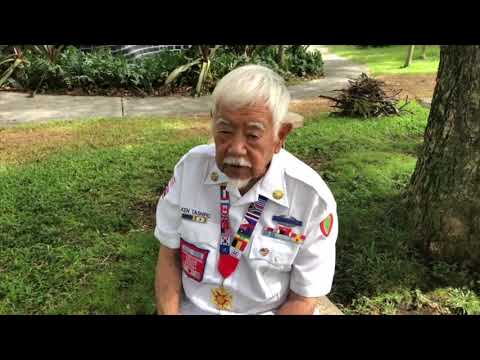
>> My name is Ken Tashiro. My wife and I like to sing, and when we were living on the big island, I was inspired to write this song, and she helped me with the lyrics.
>> What is the song?
>> It’s “This Land is Your Land,” and it was written by Woody Guthrie, and it was sung by Pete Seeger. And so we took those words, and we made new words for it that applied to Korea. I was in Korea from July 4th, 1950. I was there 1 week after the war started. I was in Japan with the occupation, so this song details all the things that I’ve seen. I started out in Busan, went up to the [INAUDIBLE] and had the first battle and went up to …
[ Chatter ]
>> Okay. All right. And then we went up to North Korea, went to Pyongyang, and then we were 5 or 10 miles south of the Yellow River when the Chinese communists came in, and so we had to retreat, so …
>> Were you part of the Task Force Smith?
>> No. If I had been, I’m afraid I would’ve been dead, but we were … I was fortunate and got back, and got back south of Seoul, and then in June of 1951, I had enough points to rotate to go back to the mainland or to Japan, and since I had almost 10 months left, they had me sent to Japan. Then I got out May of 1952, so I almost spent 5 years in the army. But this song reflected my feelings and the third verse about the people that were killed and about the people who were wounded, and maybe they weren’t wounded in body, but they were wounded in mind or in the soul, so that’s what that came from.
>> Can you take it out, the lyrics, so I could show the lyrics?
>> Yes.
>> How long did it take you to write it?
>> [INAUDIBLE].
>> Okay.
>> [INAUDIBLE].
>> You know, here I was so surprised that you wrote against the armies of North Korea and the Chinese commies too. Many of your friends, your comrades in the chapters, they’re Chinese Americans, and, first of all, you as a Japanese American, what did it feel like to you? Because there’s a very complicated relationship between US and Japan at the time because it was right after World War II and Pearl Harbor, and you were here in Hawaii. And then, of course, the Japanese had colonialized Korea before, and so there was that very complicated relationship. So what, as a Japanese American … It’s not like you chose to make all of that happen. It was more political. What, as a young boy, how did it make you feel? It must’ve been so difficult.
>> Well, as a young boy during World War II, the Japanese Americans were evacuated from the West Coast. I was born and raised in California, and we were forced to leave there and go inland. And then we went to a camp in Gila River, Arizona, and we were in camp for 2 years. Then I was sent out because my dad, who was in the 442, he was an [INAUDIBLE], he was in the 442, but it didn’t make any difference. So we had to go to Minneapolis, and I went to high school there. And finally we got back to California, and then in 1947, I volunteered for the army.
>> Why did you want to volunteer? I would’ve been so angry, honestly.
>> Well, I’m a Christian, first of all.
>> Yes.
>> And so first, I felt very angry about the war, but then I decided that the war, it’s one of those things. There’s a saying in Japanese. [FOREIGN LANGUAGE]. It means, “Can’t be helped,” but anyway. So I went in the army. I went to army language school. I studied Japanese, and …
>> Did you face any discrimination in Korea?
>> Beg your pardon?
>> Did you face any discrimination or racism in Korea?
>> Well, yeah. In any situation, because of my face, I was often taken for the enemy, and so one thing that saved me was I knew a lot of swearing in American language. And I’d swear like that, and then they’d say, “Oh, he’s GI.” So, anyway.
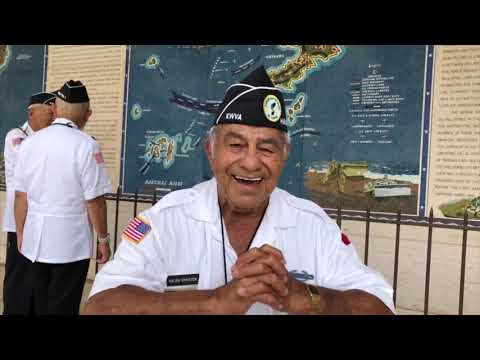
>> My name is Earl Kalani Simerson. I went to Korea in 1950, July 1950. I followed after the 5th Regimental Combat Team had left before me. I was at that time at the [Indistinct] general’s office in 4th Chapter.
[ Chatter ]
>> You’re a local native Hawaiian. As a local native Hawaiian, what did you know about Korea and the Korean War before you went, and how did you feel about it after?
>> Before the Korean War, I didn’t know nothing about Korea, but after I went there, I left Korea. In Hawaii, well, we always had kimchi, so when I was in Korea, there was a lot of kimchi, so that was my meal, kimchi and rice. Still today, I still got kimchi and rice.
>> You had kimchi before you went to Korea?
>> Yeah.
[ Chatter ]
>> Wow.
>> [FOREIGN LANGUAGE] kimchi.
[ Chatter ]
>> Tell me about your experience in the war. Your experience in the war and after.
[ Chatter ]
>> In the beginning, I saw a lot of casualties, and as a young boy, I never seen this in my life, and so I couldn’t eat for 11 days. I was so upset. And after that, I started to eat, understand I got to eat. Otherwise, I’d die. But I learned a lot about the Koreans. They were very nice people. Everywhere we went, they were taking care of every soldier, and otherwise, that’s about all [INAUDIBLE].
[ Chatter ]
>> You can talk about anything you want.
[ Chatter ]
>> Whenever you’re ready.
[ Chatter ]
>> Well, one of the things that we were there, we didn’t have supplies, so I never changed clothes for 3 months. That’s how bad. There was no supplies, no clothing.
[ Chatter ]
My clothes was just like leather. Most of us, every time we went to take a shower, everything was frozen, and so we couldn’t take showers but … And we used to burn houses to keep warm because you had no facilities, and so as we advanced, we’d stand under a house with a cigarette lighter, keep warm. That was it, but we had no winter clothing. By the time April came, 52 of the supplies came. It was too late, but that was because of the war started, and then America wasn’t in any war at that time so unprepared for it, the Korean War.
>> You know Hawaii didn’t become a state officially until 1959?
>> Yeah.
>> And you were sent to Korea in 1950. I don’t understand.
[ Chatter ]
>> Yeah, well, we were a territory of the United States.
>> I know, so did you volunteer, or were you drafted?
>> I volunteered in the Army.
>> Why would you want to volunteer for? Technically it wasn’t even your country.
>> Well, I volunteered in 1948. There was no jobs. Well, most of us all … After you got out of high school … Because of the second war, my parents went broke. We lost everything due to the Second World War so couldn’t go to college, so after I graduated from high school, joined the Army. Most of us all did. We joined the Army to get income, I guess, because at that time, there weren’t many jobs around.
[ Chatter ]
But that was one of the reasons why. Yeah.
[ Chatter ]
>> That makes me sad because you risked your life.
>> What’s that?
>> That makes me sad because you had to risk your life.
[ Chatter ]
It makes me sad because you had to risk your life for it.
>> Yes. When I think of it, oh, my god, I was lucky, but thank God.
[ Chatter ]
All my friends got wounded or were killed in action.
[ Chatter ]
So I’m thankful for what I have today.
[ Chatter ]
>> Thank you.
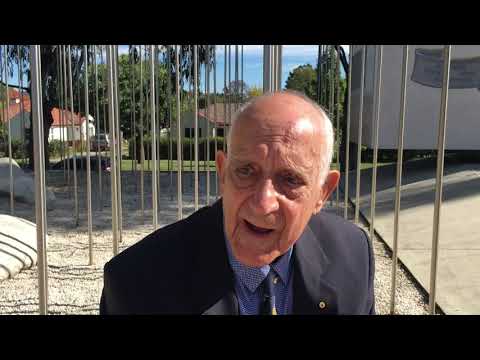
>> My name is Brigadier Colin Kahn, retired, of course, and I served in Korea in 1952 as a lieutenant platoon commander of an infantry rifle platoon, but before I say a few more words about the army, let me explain a little bit about this memorial, which I was on the planning committee, which we helped build when it was completed in the year 2000. This memorial is located in in our avenue of memorial called Anzac Parade. Anzac Parade runs from in between two major buildings in Canberra. The Australian War Memorial at the far end of the parade where veterans of all wars are honored, particularly on Anzac Day on the 25th of April. The other building it joins with is our Parliament House down on the right-hand end, and Parliament House looks up Anzac Parade and right to the War Memorial. We hope that the politicians will see a little bit looking at these memorials of what decisions they made and what some of the consequences of sending out troops and people to war.
Anzac Parade is our parade, I say, of memorials, and all people, veterans and relatives of past wars like the Boer War, World War I. Most of the veterans are all dead, of course, but their relatives walk and march here, and they go up Anzac Parade to the Boer War Memorial where a service is held on the 25th of April every year. Now the memorial itself, I say, was finished in the year 2000, and the money to build it was given by the Australian government, by the South Korean government, by all our Korean and returned servicemen organizations around Australia. It took some time to build, and we had our committee navy, army and air force, and I represented the army, and women and widows of people, of soldiers who had died. It consists of out on the front an obelisk, an obelisk which is dedicated to all those who are buried without a known grave, and we have some of those. There’s an inscription on that obelisk which comes from the war cemetery in Busan, and put that inscription on the obelisk. Now the obelisk itself then leads onto a walkway, which runs up to the main memorial itself inside the memorial, which we call a contemplative space, it is where people can come and lay wreaths and where, on special days, units will come and lay wreaths and bring visitors to wreath and see what Australia’s part was in that war. On the outside of the memorial, we have listed all the 21 countries that assisted South Korea during the war, and three badges of the Australian Army, Navy and Air Force and the badge of the British Commonwealth Division. We in the army served under the auspices of the British Commonwealth Division. Also, you can see on the scroll there all the nations that served in the war. Outside in the space out here, you will see there are three statues: one of a soldier over here, one of a sailor and one of an airman. That represents our three combat services who served in Korea. Beyond that, probably note there are no symbols to nurses here, but the Nurses Memorial is directly opposite us on the other side of the road, but they’re not here. Now these statues here are interspersed, or covering them are a series of stainless-steel poles. Some people think they represent all the dead, and, yeah, we had 250-odd killed in South Korea, but they are just indicative of it. The other thing the poles do is give us an indication of the starkness of the cold which we soldiers in particular remember of some aspects of the terrain in Korea, and they cast long, gray, cold shadows in wintertime, and that really reminds us of Korea. Also, there are some boulders, and I’m sitting on one here. They were donated by the Korean government, and they were flown back from Korea from the area around Kapyong, where we had a major battle, and placed here. Now this particular memorial, I say, is used on Anzac Day, but also units come here and have their own specific parades, army, navy and air force, and then march up Anzac Parade towards the main memorial, which is dedicated to all Australians who fought in all wars in which Australia has participated. All right? Now let me give you a little bit about the army. Know we had 17,000 Australians who fought in South Korea during the war from ’50 to ’53. There were over 200 and almost 250 killed, 1,300 almost wounded, many seriously with limbs blown off and things like that. We had four taken prisoner, and a number are still buried in graves that are unknown. As I said earlier, the majority of our dead are buried in the Korean cemetery in Busan. Now the army had three battalions that served in Korea. I served in the 1st Battalion, and, you know, you can pick up all the detail of what those battalions did. There were two phases to our war. There was what we call the mobile phase when one battalion, which came over from the occupation force in Japan, participated from October 1950, at almost the beginning of the war, and it fought all its way up the peninsula, the Chinese border, and then withdraw back again when China came into the war and helped established our peace line just north of Seoul. Two other battalions we said came in the later 2 years of the war, and I belonged to one of those, and I fought in what was called the static phase. The static phase of the war is with the war patrolling where every night and during the day sometimes, we would send our fighting patrols to attack the enemy. We’d send out ambush patrols to ambush the energy, reconnaissance patrols to recognize or hear his positions because we were located on opposite sides of the valley, the Samichon Valley. The Chinese and North Korean positions were on one side, and our positions were on this side, and we had to find out what was going on, on the other side, so we’d send patrols in to find out. This patrolling activity got particularly intense in October, November 1952, and with my battalion, which was called the 1st Battalion of the Royal Australian Regiment, we had a big hill in the middle of our area called Hill 355 or Maryang-san. It was vital ground. Vital ground means if the enemy captured it, they could almost control what’s going on all around it. One of the United Nations battalions, not an Australian battalion, was attacked very heavily up on this particular hill and almost overrun, so my battalion was sent up the next day to reoccupy the position and try to regain the initiative in the patrol battle. My platoon of 30 men, we were given the forward platoon, close to the enemy positions, and we had an intensive patrolling program where every night, we would send out half of my platoon. My platoon sergeant might take it out from last light until midnight, and then I would take the rest of the platoon from midnight until dawn, and we’d either have fighting patrols or ambush patrols to try and get the enemy as he was coming across to our positions because the name of the game was to control no-man’s-land, and this is why this position was overrun before we got there. The battalion that was there before we arrived did not patrol actively, and the enemy, the Chinese, came across no-man’s-land and dug tunnels at the base of this big hill, 355, and infiltrated soldiers across over several nights, and they occupied this position at the base of one of our positions, and they weren’t interrupted, which means that whoever was on our side wasn’t patrolling actively enough. They all should have been picked up and destroyed long before this, so when they decided to attack the hill, they were already on the hill, and our artillery and mortars had no effect on them, so they did overrun several of the positions. Anyway, a lot of the positions on this hill were destroyed, and we were sent up to reoccupy and take it over, and this is when we did all this active patrolling. Now let me tell you a story about one particular patrol, which I always remember, was a patrol which occurred that I was leading on November the 11th, 1952. I remember November the 11tth because it was Armistice Day, not for Korea, but it was Armistice Day for World War I. My platoon was under heavy artillery and shell bombardment all through the night, and we were supposed to leave at midnight, but we couldn’t get out of the position because there were too many shells falling, and we couldn’t expose ourselves out of the trenches. I managed to get the platoon out sometime after midnight, and we started to go down the hill as a fighting patrol to start to see if there are any enemies still on our hill. Halfway down the hill, we ran into an enemy ambush.
The enemy opened fire, and I was hit with a machine-gun through the chest, and I had three bullets which went through my chest. Then they threw hand grenades, and fortunately I was wearing a United States armored-proof vest, and that stopped all the grenade shrapnel, but you might ask, why didn’t it stop the bullets? Well, the bullets happened to go through the vest, the zipper, which was in the middle of the jacket, and these three bullets went through the middle of the zipper and caused all my casualties. I must say. The next morning, when I was in an American MASH hospital, American scientists visited the hospital and said, spoke to me about my action, and they decided then they had to change the design of the armored-proof vest, of the armored vest from having a zip down the middle. They put the zip under the arm, and I said, “That’s a good idea. I wish I had have had it.” Anyway, I had an interesting experience when I was shot, and it was, you know, severe wounding. I had an experience where I left my body and went up into the sky, and I was in no pain.
I could look down on the battle that was taking place with my soldiers and the Chinese soldiers on the ground, and I could see this battle taking place that I was divorced from because I was in the sky, and I suddenly realized that if I didn’t do something, I might die altogether because I shouldn’t be doing this. I should be in pain on the ground, so I forced myself to come back to the ground, and I did. I managed to come back onto the ground, and after that, my own stretcher-bearers got me and took me back to my lines, so that was my experience with an out-of-body, out-of-life experience, which I’ve had in South Korea. Now my evacuation also shows what happened in Korea.
When I was wounded in this no-man’s-land area, I was carried back to the Australian aid post in our battalion by Australian stretcher-bearers. One of those stretcher-bearers happened to be a man named Keith Payne, who eventually won a Victoria Cross, our highest award for valor. However, at my battalion aid post, I was then picked up by an Indian field-ambulance, which drove me to a clearing station. Then it was another Norwegian base picked me up there and took me to American MASH, and the MASH was 8055 MASH, which is the one you see on television every night. It was all taken at the MASH I was in. After I was treated in the MASH for several weeks, I was then taken by a bridge hospital train down to Seoul into a British hospital, then flown by an Australian medical aircraft across …
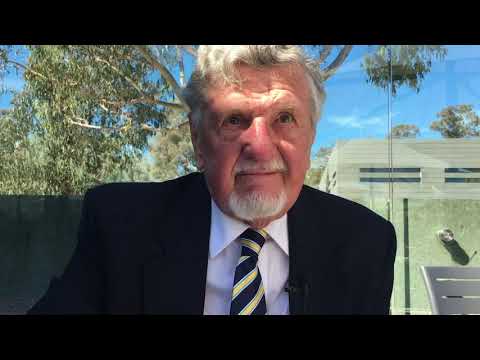
>> …threat. I’m Norman Lee. You want to know when I was first in Korea, October 1951, flying from an aircraft carrier from the Royal Australian Navy, flying Firefly aircraft. Our task was interdiction, which meant we had to keep all the roads closed, and our weaponry was bombs, so we did a lot of bombing of bridges, et cetera. Interestingly enough, we found that you can bomb a bridge, straddle it, and the bridge is not damaged. Am I going into too much technical detail here?
>> No.
>> No. So we decided to do low-level bombing with delay fuses, a 27 delay between the bomb hitting the ground and exploding, four aircraft. Me, the last aircraft in, I had to get in within 27 seconds. Obviously I did because I’m still here. Interesting things, we operated out of Guri, the carrier, out of Guri and Sasebo. We alternated between the two. We were on patrol for 10 days in the Yellow Sea. We alternated with American aircraft carriers. We were there for 5 months.
We relieved a Royal Navy aircraft carrier, and it came back and relieved us. It went down to Australia to be refitted. Highlights? I remember taking a group to Iwakuni to do a test flight on an aircraft, and on the way back, we were still in uniform because it was still wartime. We stopped at a Russia bar, and it was still dead flat, and we wandered around. We were looking for somebody to get something to eat like today, and we came across what we thought was an eating place, and we walked in, and obviously we weren’t very welcome, and it turned out that it was a private place, and then they realized we’d made a mistake, and then they welcomed us. They took us out the back, sat us down, and we had a cow sukiyaki as they called it, lots of acai beer, and then they put us onto the train back to Guri so good fun. Highlights? We went through a terrific typhoon, Typhoon Ruth. We lost aircraft off the flight deck because of the weather. The flight deck is 44 feet above the water level, and we lost a tractor off the front of the island and a boat from behind the island, so you can see how the waves at 44 feet were [INAUDIBLE]. The ship rolled 35 degrees, which is a lot of rolling in an aircraft carrier. What else can I tell you? Ask me a question.
>> Do you remember seeing some of the civilians?
>> Oh, yes, Korean. Interesting, I took the mail from the ship into Gimpo, and as a result, I went into Seoul. In Seoul, there wasn’t a building standing that didn’t have a hole in it, and the only bridge was in the river, in the Han. And when I went back about 15 years ago, multistory buildings and, what, 17 bridges across the Han now, very prosperous country. Two of my course mates were shot down during the Korean War. They both survived, very interesting. We lost 10 aircrafts, shot down. We lost three pilots killed. We incurred 90 instances of damage to aircraft in the aircraft fire. Anyway, when it came time to come home we did. We arrived in Australia and as if we had never been away. There was no … not like Vietnam where there was lots of anti. It was just the flow. We’d never been away, and we went straight into peacetime routine, and that was that. What more can I tell you?
>> So …
>> I’ll tell you a little interesting story.
>> Mm-hmm.
>> We had destroyers and frigates, surface ships, operating all the time, and you would have seen pictures of the Thames in London. There’s a cruiser sitting in the Thames, HMS Belfast and Tobruk. Tobruk was an Australian destroyer, and Belfast was a Royal Navy cruiser. We were on the east coast doing shore bombardment where the pilot directs the fall of shot from the ships. All right? Are you still with me?
>> Mm-hmm.
>> Good. Stay with me. Anyway, exchange of call signs between the ship and myself. Went ahead shooting. I made corrections to their fall of shot, and there was a problem. The ship had to come closer. Something was awfully wrong, and it turned out I was correcting the shot from the destroyer on the cruiser’s fall of shot.
>> Mm.
>> White phosphorus, Willy Peter, does this make sense to you?
>> Yes.
>> Anyway, about a year later on back in Australia, we had the Navy officers out to lunch, and their gunning officer said, “You’re an aviator,” and he said, “I’ve met the biggest idiot aviator in Korea.” That was me. Good story.
>> Did you tell him it was you?
>> Now, during the talks, truce talks, we were on the east coast at Hungnam, which is on down the east side. We normally operated on the west side. And the word went round the truce talks were almost going to happen, and we were given a code word, and the code word was Brandywine. And if we heard the code word … We were flying. Heard the code word Brandywine, stop bombing, rocketing, whatever you were doing because the truce had been declared. And the joke went around the squadron that if you had just dropped a bomb, you’d better duck down and grab it before it hit the ground. Joke. We need to worry because it was, what, 18 months, almost 2 years before we finally had a truce. Yeah. Now my reaction to being there? I could remember one time forming up, flying back from a bombing mission on my leader, and I suddenly had a thought, “What am I doing here 10,000 miles away from home bombing these people?” And that was it. I mean, anytime I ever thought about it … When you’re 21, it doesn’t matter, does it?
>> So have you thought about that question now?
>> No, doesn’t worry me.
>> Well, I’m glad you made it home safe.
>> I did, didn’t I? Obviously.
>> And you stayed in the service for a long time until you retired as a commodore.
>> Yeah, 33 years. I had commanded three ships …
>> Mm.
>> … which is good. So I was both an aviator and a seaman officer.
>> Since you were with the Navy for a very long time, what do you think the significance of Australia’s Navy was in Korea?
>> Then?
>> Mm-hmm.
>> Not that great really, the surface ships, I mean. The carrier, yes. We certainly … We did as good as what the Americans and everybody else was doing, including 77 Squadron. But the surface ships, all they could really do is gunfire ashore. It wasn’t a great effort. Well, I better clarify that. They were there from the beginning until the end. We rotated ships through in support as you would do, and some of them were pretty heavily involved, but not like the second World War.
>> Of course. The Second World War was a little different.
>> That’s a little different.
>> And so many more died, and it was …
>> Yeah.
>> It was a little more grander in scale, but it is true that the Korean War was a united effort of more different people from different continents, and I would think that Australians, coming from Oceania, as you said, 10,000 miles away and yet still participating in this war, you may have wondered why. But if you look back, it was really … You defended the freedom of South Korea.
>> Well, I think, looking back on it, we very much recognized the United Nations concept, and if the United Nations said we’ve got to go to war, we went to war, and it really was as simple as that. That’s my opinion. What do you think?
>> Yeah, I became very sympathetic to the South Koreans.
>> Yeah.
>> We’ll do his shortly, but yeah. I mean …
>> Since then, Australia has been involved in wars it should not have been involved in, right?
>> Mm-hmm.
>> The Korean War was a legitimate action. There’s no question about that to me.
>> Well, it stopped the threat of communism all over in that region.
>> So they say, and we’re led to believe.
>> You can tell for sure. I mean, there’s a stark difference between North and South Korea. You know what you fought for. It’s one country, I mean, one people, but the Allied helped South Korea and took down North Korea. I hope that you’re very proud.
>> Well, yeah. I’ve accepted that’s what we should have been doing, and that’s what we did, and you’re right. I’ll tell you a final funny. Do you want to hear a final funny?
>> Yes.
>> On the flight deck of the carrier, having started the aircraft, I couldn’t get my gun sight to work. No gun sight, and I fiddle with it, and I change the bulbs in it, and still no gun sight. And off I went, and we came across some Chinese, and all I could do was sort of point and spray, right? Right back on board the carrier, and I was sitting in a little cafe behind the island with my air group commander, the boss. There was a knock on the door, and a petty officer came in and said, “[INAUDIBLE] Lee, we’ve found out what’s wrong with your gun sight,” and I said, “Oh, good, what? Bad maintenance?” “No, no, no, no, sir. The brilliance was turned right down.” Good story? Naughty, naughty it was, too.
[ Chatter ]
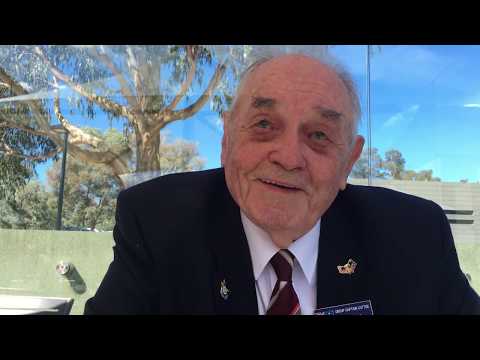
>> It’s amazing now, isn’t it?
>> I am Milton Cottee, retired from the Air Force. I’m 90 years old, and I did my flying training in 1948 and ’49, after World War II. I was married during World War II, and that is significant to something I’ll say a bit later. After I completed my flying training, I was posted up to the British Commonwealth Occupation Forces in Japan to a place called Iwakuni where our squadron, No. 77, was based, and that posting was to have been for 6 months. Towards the end of 6 months, I decided to bring my bride up to Japan, and she arrived on the 28th of July, 1950. Sorry, 28th of … well, 2, 3 days before the war started, which was, yeah, June, June, yeah, June. Anyway, so I had my wife with me, and she shared all of my experiences during the Korean War. On the 25th of June when the war started, our squadron was put on immediate standby about 4 hours later because we were part of the United Nations’ battle group, and we were asked to go on standby. We armed our aircraft and got them ready for war. However, our government’s approval was necessary before we could get involved in the war, and that took 2 weeks, 2 weeks where we were waiting and learning as much as we could about where Korea was, and how could we get there and what was happening, so we were all apprehensive as to what was to happen. On the 2nd of July, asleep in a married quarter on the base of Iwakuni, a phone call woke me up at about 2 o’clock in the morning, and a voice said, “Milt, our government has approved us to go to war. There will be a jeep around to pick you up in 1/2 hour. You’re off on the first mission. All you need is your flying suit,” so I had to get up and leave my wife behind and go to war. It was the first time that I’d flown a Mustang at night, which was quite an experience, and our mission was to give top cover, top fighter cover, to DC-3 aircraft or Dakota aircraft that were evacuating civilians from Taejon in the middle of Korea. We flew across the sea towards Korea, and we normally flew a section of four aircraft. Very rarely did we fly any fewer than four aircraft in one section. One aircraft had to turn back with radio trouble, so that left three of us on the mission. We were fueled up with fuel in every conceivable tank, and our aircraft were consequently unstable. We had full guns at 2,500 rounds of .5 ammunition in the six guns, and we were ready for air-to-air combat. I had had very little training as a fighter pilot in that role and was wondering how I was going to manage. As we approached the coast of Korea, one of the members, number three, surged forward, and we wondered where he was going because we were normally in a formation, and the leader called up and said, “Where are you going, Tom?” And then the penny dropped. He wanted to be first into Korea, and he was. We chased him, but we couldn’t catch him before he crossed the coast. Anyway, it wasn’t a very successful mission. We found an airfield which we thought was the right one, circled around it for a long while and then went back home to Japan. My third mission was very eventful. We checked in with a control center and were given coordinates to go to, which was to a little place called Pyeongtaek just south of Seoul, and that’s where the bomb line was. That’s where the enemy had advanced to at this stage, and there was an airborne forward air controller giving us directions as to what to do, but we contacted him by radio, and we were about 10 miles away from him when he suddenly called up and said, “Little friends, little friends, come, hubba-hubba. I’m being attacked.” Now little friends is a name for Mustangs which derived out of World War II because they were escorting bombers into Germany, and the bomber crews called them little friends, and hubba, hubba is come quickly, so it was a funny mix of language that we heard on the radio. I was the first to see the other aircraft that was supposedly unfriendly, and I thought, “Well, I’ll have to shoot him down.” He was much lower than I was, and I chased him, and I was just about to fire with a no-deflection shot, which would’ve … couldn’t have missed him when he yawed out to one side, and I saw South Korean markings on the side, and I refrained from shooting and pulled up thinking that maybe it was a North Korean in South Korean markings, so I didn’t want him to have the opportunity to shoot at me, so I pulled way up above him and looked down while I was upside down and eventually determined that it was a South Korean aircraft that had come out of the sun to have a look at the airborne forward air controller. Now, back to the forward air controller, who had as targets or had had as a target a little bridge over a little river near Pyeongtaek, which he wanted to us to knock down. Now the armaments we had were just 3-inch rockets with 60-pound explosive heads, and we thought that they would be rather ineffective against a bridge. Nevertheless, as we started attacking the bridge, tanks were coming down the highway, and they were firing at us, so I diverted away from one attack to fire at the tanks, and at that stage, we hadn’t worked out that the best way to hit a tank was from the rear, and I was firing at them from the front. Anyway, it stopped the tanks from progressing down the highway, and then we tried to knock the bridge down, expending all our ammunition, and then we didn’t have enough fuel to get back to our base in Japan, so the forward air controller said, “Well, you can come back to my airfield at Taejon,” and we followed him, and it was late in the even and getting dark, and by the time we landed at this little airfield at Taejon, it was crowded with aircraft of all types, and we had hardly a place to park our aircraft, and here we were, three Australians in funny-looking flying suits which had been made Japan. They were actually white at the time, and we were carrying around a Mae West and a .38 revolver, and we were trying to get a message back to our base at Iwakuni in Japan. We found a communicator who wouldn’t take our message so … because of higher priority traffic at the time. We could hear artillery in the distance, and we wondered whether we would be overrun in during the night. We found a place to sleep in an empty house, and the next day, we foraged around for something to eat. The Americans on the base didn’t know that Australia had entered the war, so they were trying to get us to do things that we didn’t want to do. Anyway, we didn’t … We had to get some fuel, so we found an airman with a fuel tanker, and he didn’t want to give us any fuel because of the shortage of fuel, and I traded my revolver for a tank of fuel, and that was the way we got back home. Anyway, because of that, the leader that I had normally flown with had flown on another mission with someone else, and he was our first casualty, and if it hadn’t been for the fact that we had been delayed from getting back to our base that night … He launched the next day, before we got back to the base, and he was our first casualty. He flew into the target and was killed. That upset us to no end, and shortly after that, we lost our commanding officer, and we then progressively lost more and more people. We lost something like 41 pilots and many more aircraft. The missions that I flew early in the war were hectic because the enemy was advancing regardless of what we were doing. We were trying to stop them all the time, and when they got down as far as the Nakdong River, General MacArthur, the overall commander, said, “Hold the river. Don’t let them cross the river,” and we fought valiantly to help troops on the ground, who were on one side of the river and enemy on the other side. I found a bridge across the Nakdong River at a place called Chilgok, and I had two 500-pound bombs, and I thought, “Well, maybe they will want to cross the bridge, so I’ll knock it down.” I tried to hit the bridge with my two bombs, and I missed fortunately because several days later a message came down from General MacArthur’s headquarters saying, “That bridge is off-limits because we want to take an offensive shortly, and we want to cross the river on that bridge.” Anyway, that bridge is still standing even though a new bridge has been built beside it at Chilgok now. Now I have been back to Korea a couple of times since the war, and the battle of the Nakdong River is quite a classic. We were able to hold it. A funny incident occurred while we were doing that. We were flying from a place called Taegu, which is now called Daegu, and it was a very active airfield, and we would fly across from Iwakuni in Japan with a load of weaponry and deliver it and then refuel and rearm at Daegu, and one of our targets given to us out of Daegu was a railway tunnel in which North Koreans were putting supplies and men to hide during the day, and we were to knock down the entrance to the tunnel. We had rockets, and to get rockets onto the tunnel mouth, we had to fly very low along the railway line approaching the tunnel, bearing in mind that there was a hill to go up and over when we fired off our rockets, and after a while, we were getting out the odd rocket down the tunnel, and every time a rocket went down the tunnel and went off inside the tunnel, there would be a huge smoke ring come back out of the tunnel, and this amused us very much, and from then on, it was a competition to see who could blow the best smoke ring. And of course we were very effective in knocking out whatever was stored in the tunnel. We knocked down bridges. We knocked down gunning placements. We strafed dug-in troops. We had no rules of engagement actually. I wasn’t aware of any rules of engagement. We made up our mind as we went along. In wars these days, you have rules of engagement. You can hit this, or you can’t hit that, that sort of thing. I feel very sorry for many of the citizens of South Korea because often we would be tasked to fire at people on the ground that had enemy mixed in with the local population, and that leaves me very sad that we had to do that. In fact, I’m emotional about that. Anyway, all of this time, my wife was back in Iwakuni in Japan, and later in the year, later in 1950, we moved across to Korea to a place called Pohang, and it was a bare concrete strip with no facilities at all, and we lived in tents. And it was a very frugal existence, and we were resupplied by a transport aircraft coming out of Japan, and I can remember on one sortie out of Pohang where we went up as far as occupied Seoul and the airfield there at Gimpo, and I dropped two bombs on the main runway at Gimpo, and one of those bombs hit the runway and made a big crater. About a week later, the landing at Incheon had occurred, and Gimpo had been retaken, and we flew into Gimpo at night to support a paradrop operation that was being launched at Sunchon and Sukchon, the biggest paratroop operation in the world, I understand. Anyway, this was to cut off enemy troops from … that were trying to retreat towards the north, and I can remember running over a rough patch on the runway, and I thought to myself, “Well, they filled in my bomb crater, and I’ve just run over it.” We spent the night in a bombed-out terminal building at Gimpo. It was absolutely destroyed, and it was the only cover we had and the only place we could spend the night, and the next morning, we supported this big paratroop drop at Sukchon and Sunchon, flying in amongst the paratroopers as they dropped down and giving them support. Now after I’d flown 50 missions, which was towards the end of 1950, I was posted back to Australia and went back to Australia with my wife on a ship out of Kure on what I call Hell Ship Changti, and I have been back to Korea several times, and I’m amazed at the reconstruction of the country. We left it with hardly a building standing anywhere. Anything that stood up was knocked down, and now to go back and see the advances South Korea has made is quite incredible. And a group of us were fated at a ceremony at Chilgok, which was played on TV live, and we were on a stage with garlands of flowers around our necks and hailed as heroes, which was rather … forgotten the word. It was a little unusual for us to be called heroes. Anyway, everywhere we went in Korea, we were hailed as heroes, but I don’t think we deserved that. Anyway, in front of us on this stage, in front of a vast number of people on the side of the river, the Nakdong River there, there was a row of little tables, and on the tables were what we thought were little gift boxes, and we were asked to approach these tables after a while, and in each of these little boxes was some soft clay, and we were asked to make a handprint. We put our hands down on the clay and pushed it into the clay, and when we took our hands away, there was a handprint. Now these were to be the first exhibit in what was to be called the Peace Museum along the Nakdong River, and I’m rather keen to hear whether that museum has progressed and how finalized it is. I would love to go back and see it. Since then, I have had a very unusual Air Force career, becoming a test pilot, flew with the RAF on flight tests of their V bombers and then came back to Australia as chief test pilot for our own Air Force and actually took part in a top-gun competition that squadrons were entered into each year, and two of us became top guns for a year, and I blamed the Korean War for that because we ended up being able to fly very accurately to be able to aim accurately and feel what the aircraft was doing very precisely. I would like to add that my younger brother, name of Keith, Keith Cottee, thought that, “If Milt can do it, so can I,” so he joined the Air Force, and he was trained on No. 6 postwar flying training course. He was posted to Gimpo and flew Meteors out of Gimpo, so two brothers flew in the Korean War. Okay.
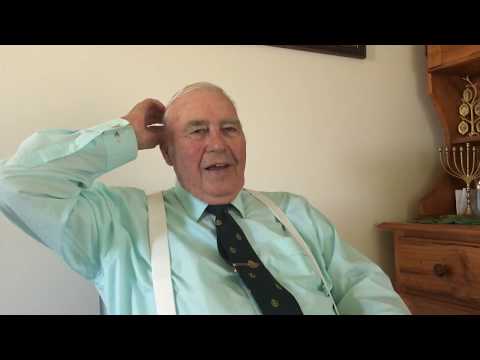
>> Well, my name is Kevin Collin Joseph Berriman, commonly known as Col. I joined the Army on the 25th of October 1951, on my 17th birthday, as the Korea War was waging at that time. However, as I was underaged, at 17, you weren’t allowed to go into active service until you were 19. So therefore, the first 2 years of my Army life was spent waiting to go to Korea, in fact. I finally made it just after the Armistice when I went back for a second tour on the line. When we arrived, we did not have to put up with the shelling and the major fighting patrol activity, however, when I arrived my immediate thought was the sympathy for the people, and most of the populous was in starvation at that time. It was a terrible time for the South Korean people. When we arrived, there was still activity up on the DMZ. We established the demarcation zone, and our main activity at the time was patrolling inside the zone, which was allowed in those days. We patrolled one side, and the Chinese, who were still there, patrolled the other side, and we used to to wave to each other occasionally in the center. There was still activity with North Korea crossing the border on several occasions. Of course, we had to keep the whole area fortified, and I served there for approximately 12 months in that activity. There were several clashes on the border at that time, and I was injured during one of them where we had to chase some suspects. We chased them into a mine field. Well, we didn’t ever find out who they … I’ll have to stop. Anyway, we never got to catch the four that we were chasing. We saw them, nearly caught them, but they went into a mine field, and we stopped the chase, but sadly saw them … Well, we couldn’t interview them because there was nothing left of them to interview after that. During the chase, I sadly fell down a ravine, and I didn’t know it at the time, but I’d fractured my spine, and really I was out of action for some weeks after that. I spent time in hospital, and then came back to Korea for a short time where we engaged in more patrol activities, especially along the DMZ. Then my time was up in Korea, and I was hospitalized again, but over in Japan while I was in hospital, I was approached by the public relations officer. They wanted somebody to look after the office in Japan for a while, and they recruited me as a junior noncommissioned officer in the public relations office, where we were engaged in photography of Operation Glory, which was where the exchange of the dead occurred. We were receiving our dead, which had been buried in North Korean graves before the establishment of the static war lines on the Kansas Line on the 38th parallel. And also, we were working returning North Korea and Chinese dead at that time. I was engaged in the fringes of that, mainly working with a photographer that was taking photos of the Operation Glory activities. Some of them are still in the memorial at the present time, when our dead were coming back, and we were sending dead back over to North Korea. I left Japan in July 1955, so I was over there for almost 2 years, and I came back to Australia. Korea had finished with then. I was just due to go over to the mine action, the emergency which was occurring over there, but was found to be, because of my injuries, no longer suitable for the infantry or active service. I retired from the Army in 1957 under the care of our Department of Veteran’s Affairs, who really have cared for me since I was 22 years old. I was re-educated through our Department of Veteran’s Affairs, became an accountant with a university degree and worked with the public service for a further 25 years until my injuries caught up with me again at the age of 48 when I was retired from public work. Since then, I’ve had another career of volunteer work for the ex-service community, mainly in welfare and bereavements, and that’s it.
>> So can you tell us a little bit about how many veterans in Australia are still remaining?
>> Sadly … Can we stop for a moment? You asked me, Hannah, how many veterans are left in Australia. There were 17,850 served in Korea from 1950 until 1956. Now, as of October last year, there were less then 3,000 of us still alive. To be in fact, there was only 2,700. They’re dying very quickly. At the present time, there would be no more than 2,400 of us left. Now, I can also give you some casualty figures of those that we lost. Those that paid the supreme sacrifice during their service in Korea was a total of 356 who lost their lives, 340 before the cease fire on July 1953, and 18 after the uneasy armistice that occurred on that date. Is there anything else that you would like?
>> POWs, missing in action?
>> Missing in action, we still have 42 that are missing in action, about half from pilots that were lost, mostly in the North. Only one that we haven’t recovered in South Korea. The rest of the missing in action are Army personnel mostly in the DMZ, which nobody can find in any case, even to this day. We suspect that some of those pilots that were lost in the North could have gone back on recoveries that have occurred by the Americans. It’s a possibility that they could have some of them in Hawaii. We’re investigating this matter at the present time by organizing a memorandum of understanding with the American authorities. Those that were recovered, of course, are all in the Hawaii cemetery, the beautiful American cemetery in Hawaii. I think it’s called the Punchbowl. Perhaps they could be, but it’s very doubtful if any of the 22 Army personnel are there. They’re mostly still in the demilitarized zone. There’s thousands of Chinese still there, and Americans, many thousands of them, still missing. That’s about all that we can say about the MIAs. Under the current regime in North Korea, I don’t think we’ll ever recover any more of those. Anyway, it’s so long ago now, what, over 60 years. What’s to recover?
>> How about POWs? Australian POWs?
>> POWs, there are very few of them alive now. I can’t tell you the exact … We had probably over 20, 25. Some of them died in captivity, three of them, to my mind. I don’t know whether we have any still alive at the present time. I think there was about less than 30 we had POWs in Australia. What else?
>> What do you think is significant about Australian contribution in the Korean War?
>> What?
>> Australia’s contribution in the Korean War unlike other countries? For example, on top of my head, I could think of is the Australians contributed all the …
>> Well, for our size, we contributed quite a lot, especially … You’ve heard some stories from two of our pilots, both from the Navy and from our own 77 Squadron, who flew there. Our Army contribution, of course, was three infantry battalions, which for our population at that time, 17,850 of us served, so for our small population of seven million was … Our actions, of course, in the infantry we contributed to several major battles: the taking of Maryang-san, which during the static war was … Although we took it in October 1951, it was lost shortly after, unfortunately, but Maryang-san was the main Chinese outpost on the Jamestown Line. That was a major battle. The Battle of Kapyong, of course. Australians and the Canadians held the line at Kapyong during the big Chinese offensive of 1951, in April 1951. The Australian battalion 3 RAR held the Chinese offensive during that time long enough, for 3 days, for them to establish the defenses around Seoul, which stopped the Northern advance. And then, of course, the static war period happened shortly after that in October 1951, where the war stayed until the armistice just about the 38th parallel. For a small force of 17,000, as I said, we lost almost 400 killed in action. Many of us were wounded and injured, like myself, I suppose. I was one of the injured. Anyway, that’s about all I can say really. It was a long time ago. My main thoughts and feelings during the time that I served was heart rending. I was so sad to see the population starving, especially children, which upset me very much as a young man. All that I can say is my … The sacrifice that the South Korea people paid was enormous, and they must be congratulated for how they’ve lifted themselves up after that disastrous time to such a prosperous country that it is today, and I’m very proud to be concerned with the recovery of Korea. They’ve done a wonderful job. That’s about all. I can’t think of anything else. I get bad thoughts when I think of what the people suffered. It was a terrible, terrible time for them. Terrible thing to see. We helped them as much as we could, of course, but we couldn’t feed the whole population. Anyway, that’s it.
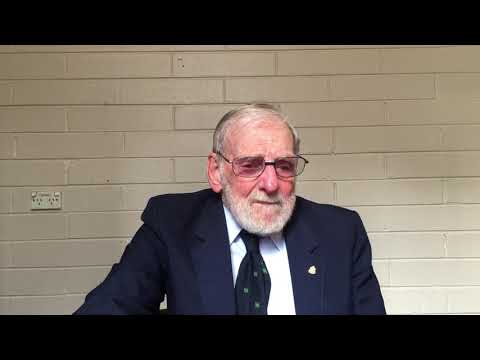
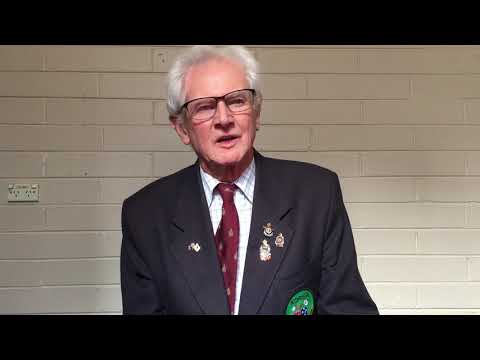
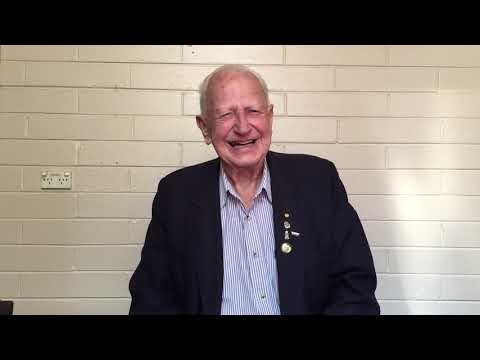
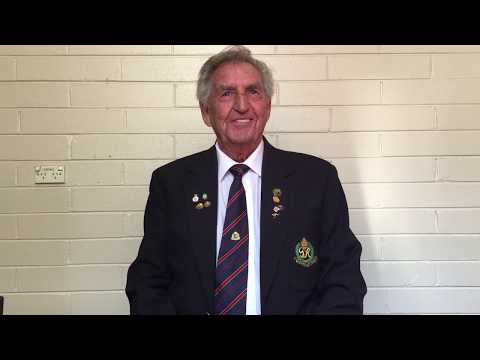
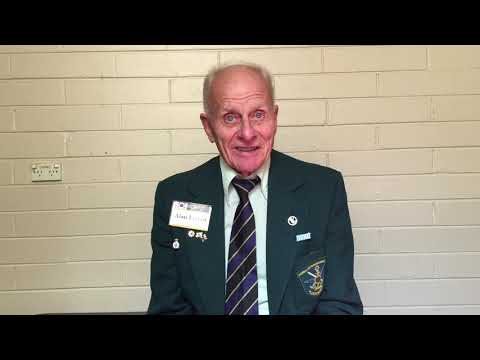
>> Okay. I’m Alan Everett. I’m not Australian. I came from England originally. I served in the First Essex Regiment, and in those days, in 1952, all the British men at the age of 18 conscripted, and so I was conscripted, and I elected to stay in the army for 3 years rather than just 2 years National Service because that was half pay, and I served in Germany, then Korea and then Hong Kong, so that was my 3 years which was spent mainly overseas. I was very fortunate in my training because I was trained to be a signalman, so I went to the School of Infantry in England, and in that School of Infantry, all the officers and NCOs all combined in their exercises, so it was quite an all-embracing training, so I then went to Germany, and then my battalion got moved to Korea, and we arrived just after the ceasefire, so I’m not a peacemaker. I’m a peacekeeper. So we were stationed on the southern bank of the Indian River for 12 months, and that was incredibly cold and incredibly hot, and we didn’t get to see much of the people because we were in a defensive position, and so most of the stories we heard were from the previous people who had been through the war itself, so that was quite a challenge, and I found since I left the army and I was trained in Hong Kong, as a national servicemen, you’re allowed to get some retraining to get back into civilian life. I wanted to go to agriculture college, and I had to study chemistry to meet my qualifications, so I went to the Royal Agriculture College at Cirencester in Gloucestershire, and I did my course there. Farmed in England, met my wife Nicole who you’ve met, and we had been together for 8 days, and then I came out to Australia, so that was quite [INAUDIBLE], and when I arrived in Australia, I got myself a job. It was great. A year later, I rang up and proposed to Nicole, and she came out with her mother, and we got married over here, so quite a different story to what you expected, I guess. So my servicing career, I did so much there because I was working in the signals office, and being part of the brigade and the companies that reformed our defense positions, so I was in contact with people all the time, so when the opportunity here came available for to be a secretary for the Korea Veterans, I offered to take that job on, so I’ve been National Secretary for 8 years, but I haven’t been involved in the war side of the whole thing. The impact of the Korean War hit me when I had been here some time because the Australian soldiers that came back from Korea were not recognized as having been part of a war, and they were actually refused entry, particularly in New South Wales, to go into the returning servicemen’s clubs. They said they weren’t eligible to be members, and that took some time to overcome which is very sad, but that’s the sort of reception the Australian soldiers got when they came back to Australia. We didn’t have that in England. We just went back, and we just got on with our jobs, and it was no problem. Here in Australia, in Maldon, every year, we have a church service run by a Korean church in Maldon, and we have one of our biggest attendances of the year. We have about 90 people turn up, and about a good half of them will be veterans, [INAUDIBLE] one, and one day I was standing next to a father with his little Korean boy, and the little boy talked to his father and said, “Why are all these people here?” His father thought for a bit, and he said, “Well, without these people, I wouldn’t be here. Your family wouldn’t be here, and you wouldn’t be here.” I think that says it all. It’s such a moving experience to me. I found that quite fascinating, and the Korean community here are so helpful and want to look after the veterans as we get less and less, so it’s a beautiful encounter, that was. Now, we’ve given you the background to the memorial in Queensland, in Cascade Gardens. To me, that is the most beautiful memorial that anyone could make for any country. It’s a tribute to the people of Korea as well as the veterans from all nations who served, and when you see it, there’s a whole history that goes with it, but it’s well worth it, set aside in a beautiful park, and it depicts everything that is Australian and Korean. It’s just so well … And then, there’s another little memorial in Alexandra Heads, which a small association got formed in Queensland and the Sunshine Coast, and they made it specific for their veterans, so they’ve got this wall, and when one of their members dies, they put a brass plaque on the wall with his name and his service record on it, and I think that’s another one of the best memorials I’ve ever seen, so that’s my story.
